大俠立志傳問答攻略 (Heros' Adventures Notes)
2024-07-28
筆記大俠立志傳關於各種問答、猜字、對聯以及取得連中三元的攻略。
如何連中三元
先前往「楚襄城」隆中書院,完成五天的回答會取得「院試」資格
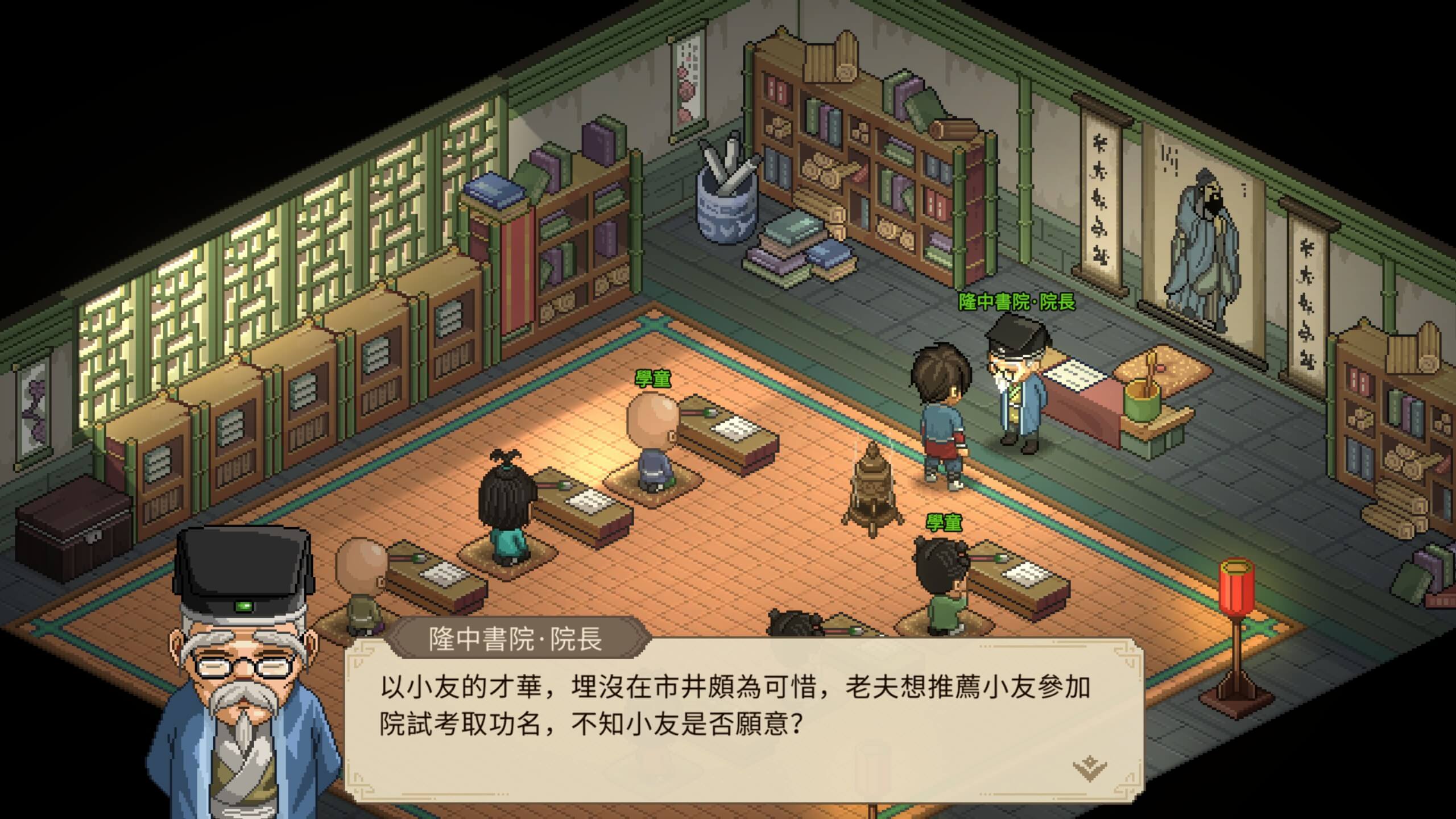
前往「楚襄城」衙門進行「院試」,完成後等待三日飛鴿傳書通知取得「秀才」資格
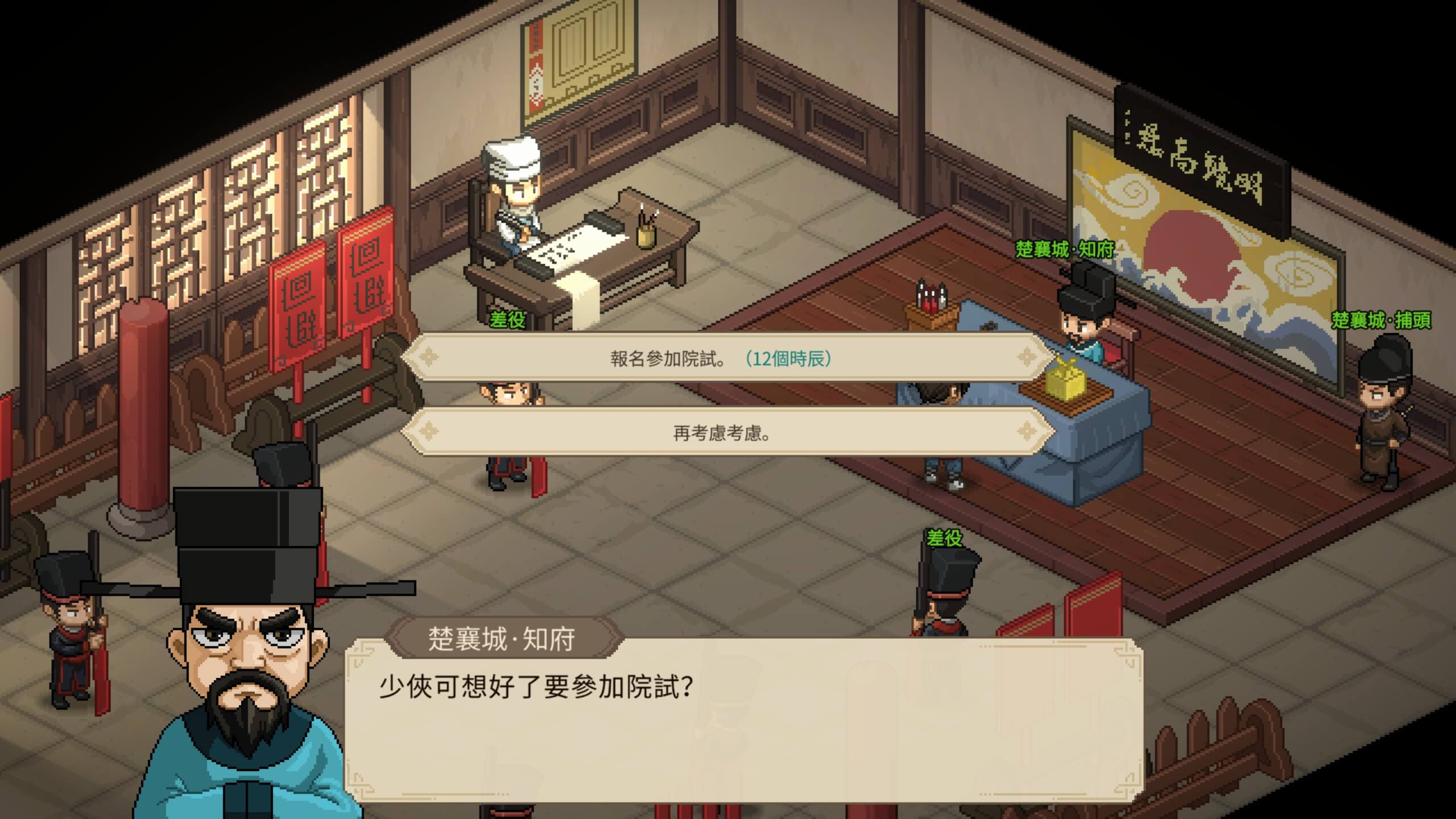
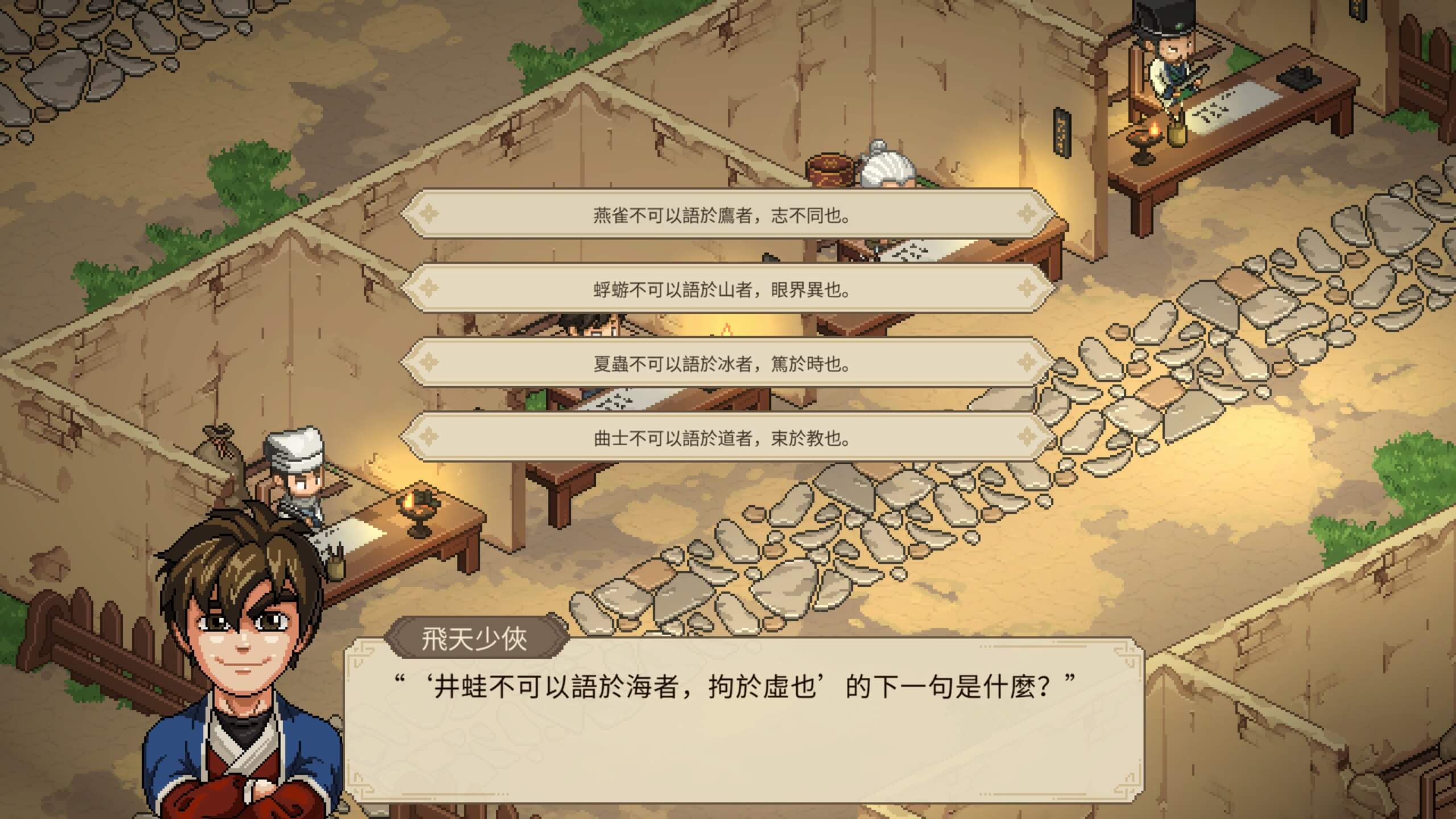
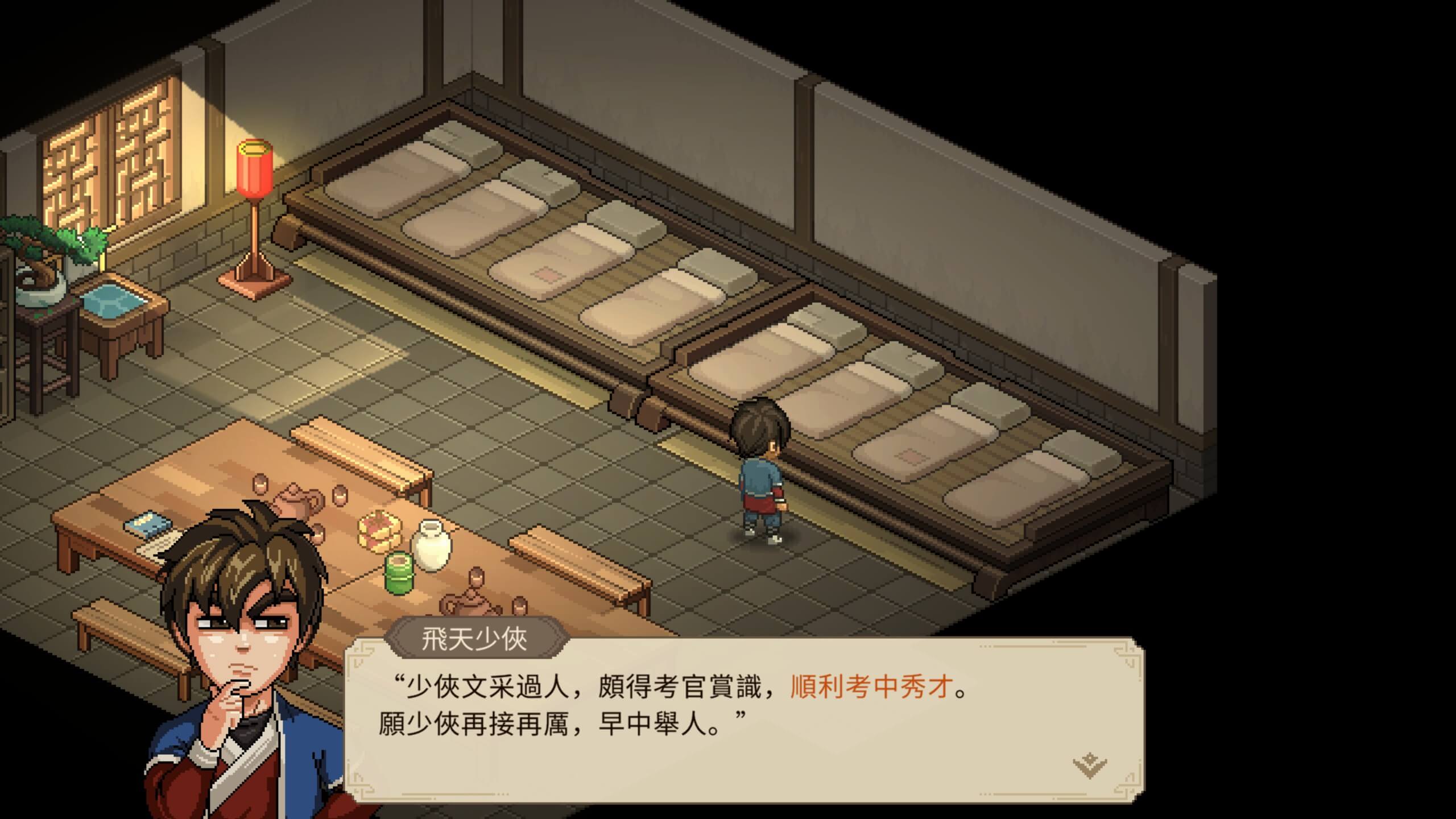
前往「大梁城」太學館,完成五天的回答會取得「鄉試」資格
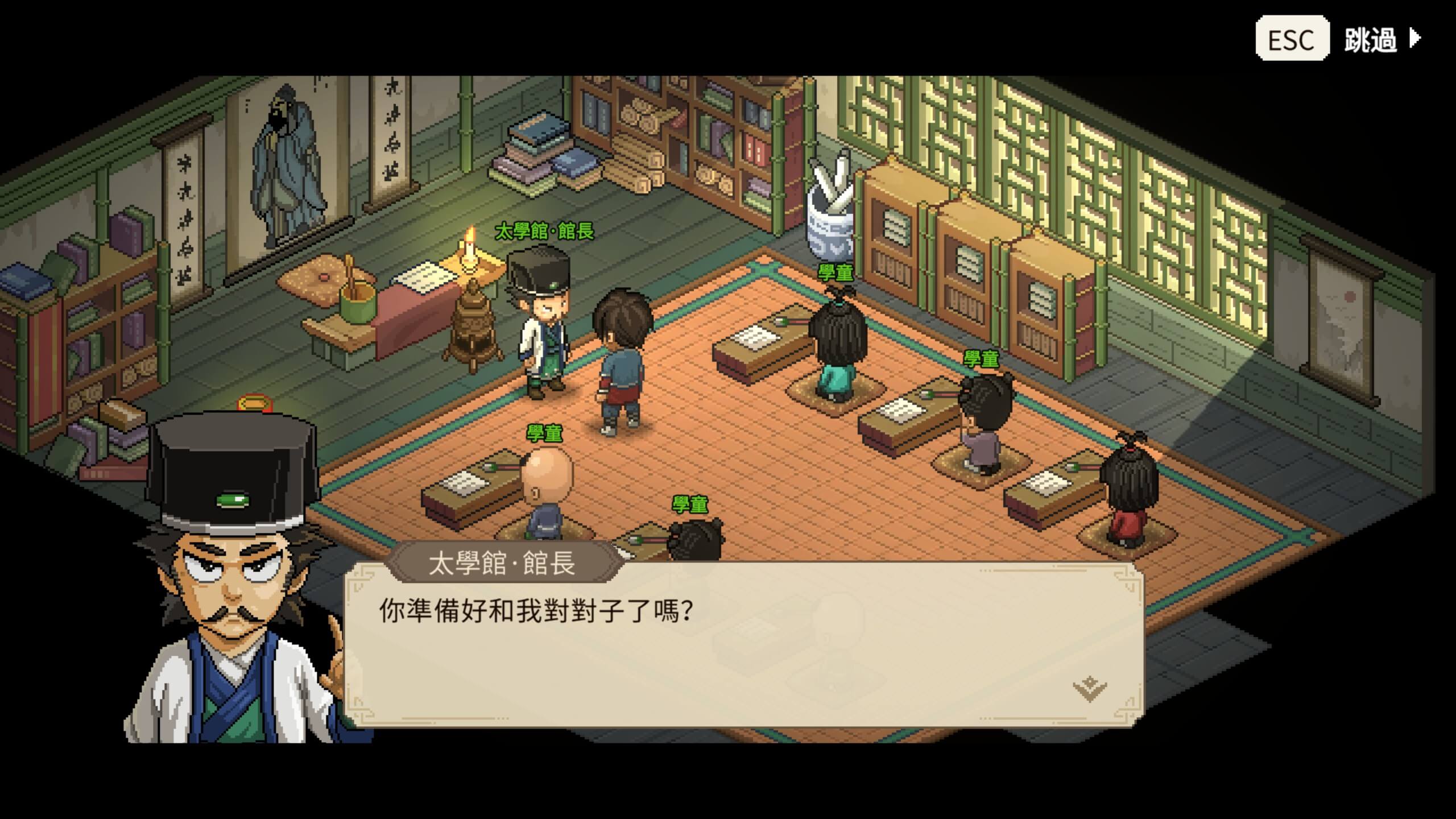
前往「大梁城」衙門進行「鄉試」,完成後等待三日飛鴿傳書通知取得「舉人」資格
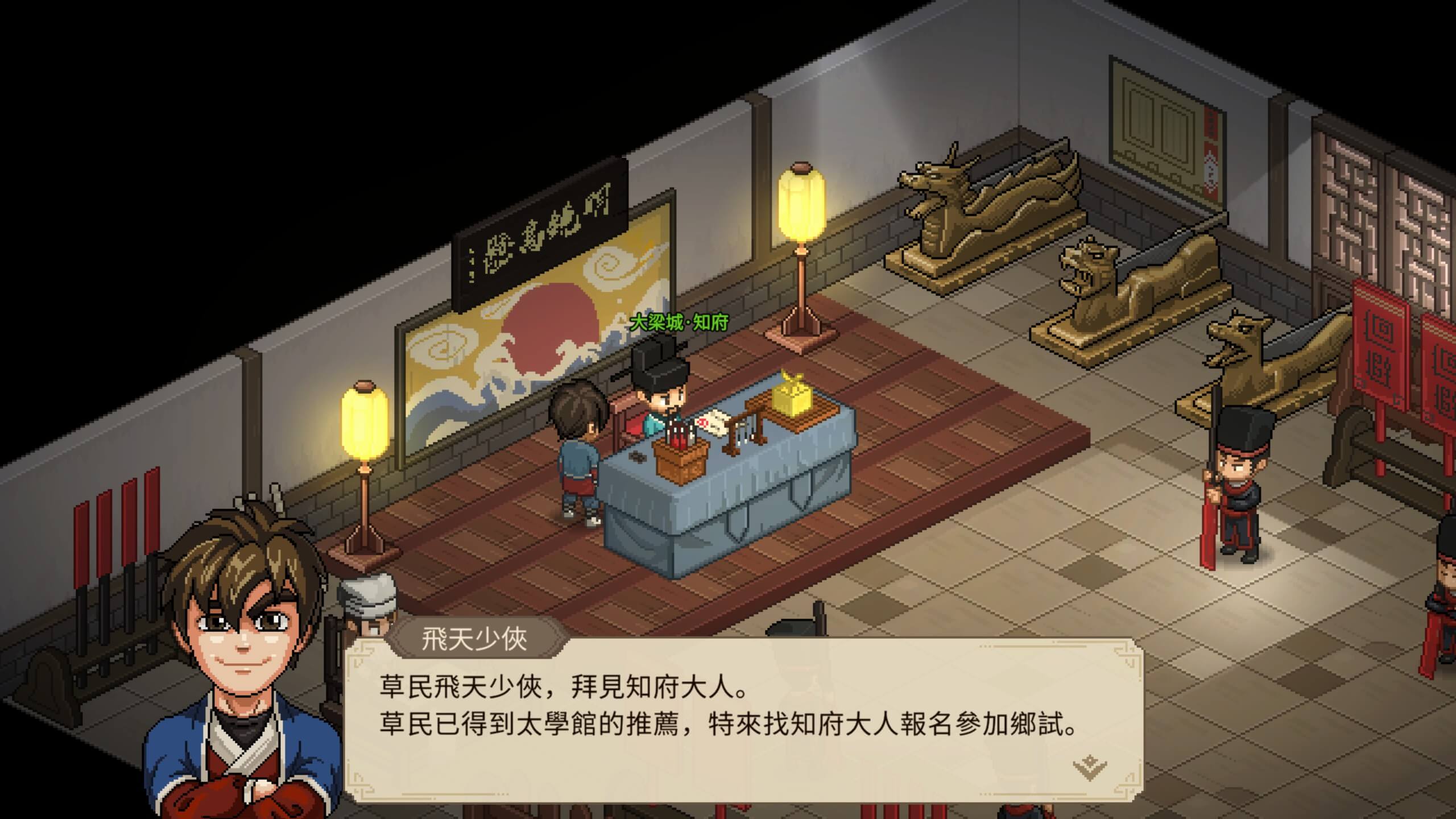
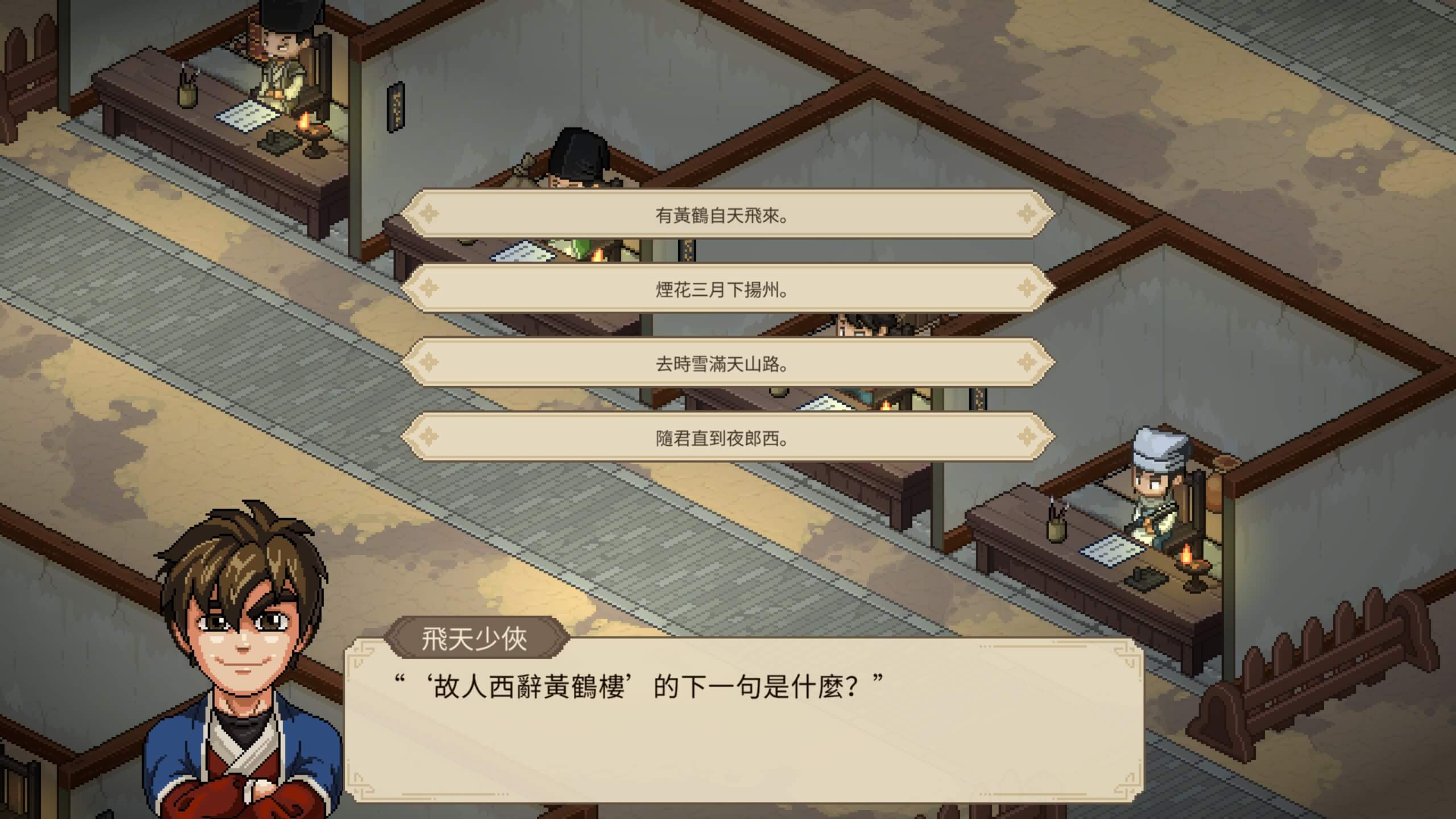
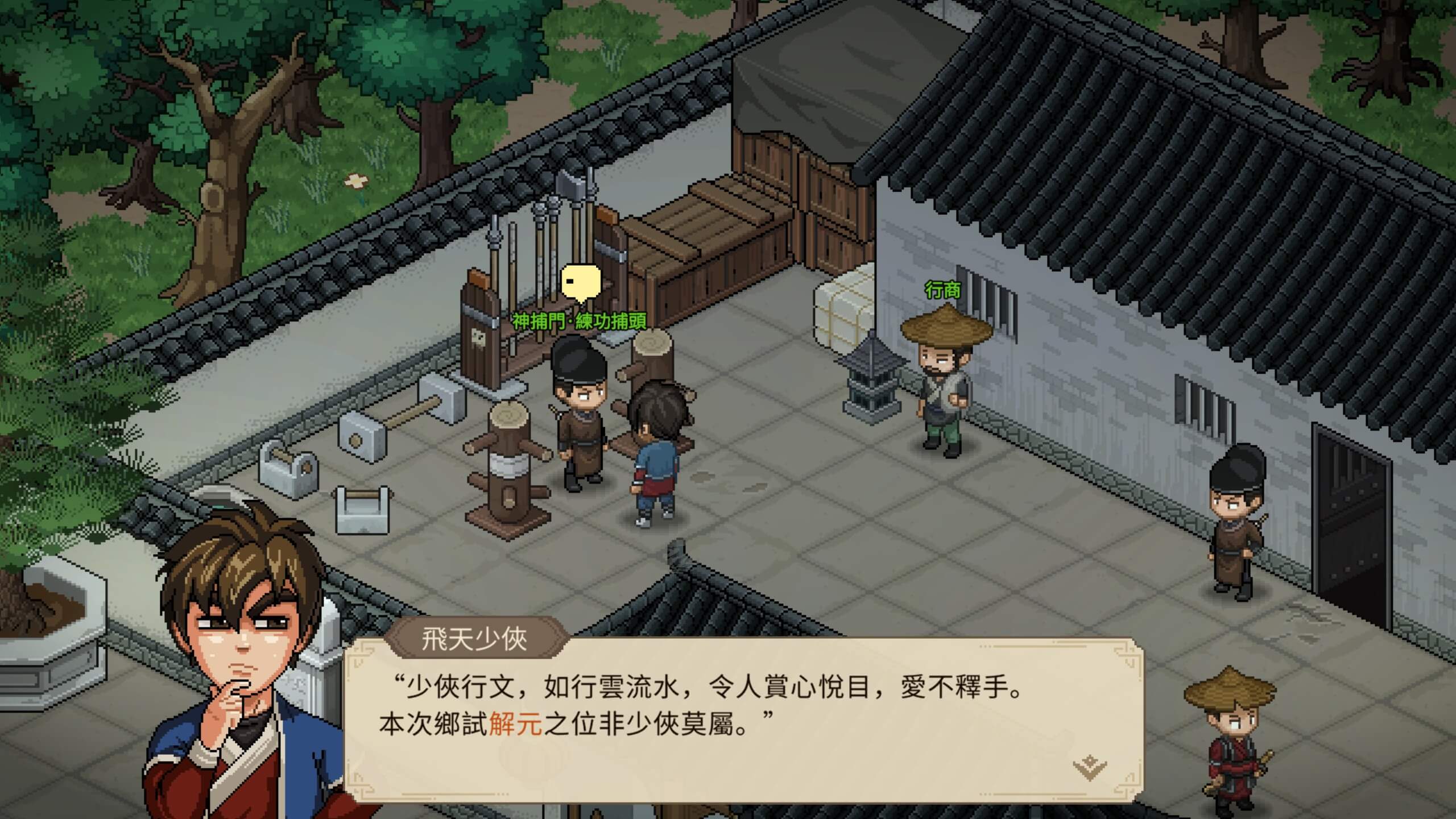
前往「儒聖館」進行「會試」,完成後等待三日前往「大梁城」衙門口前查榜,取得「貢士」資格
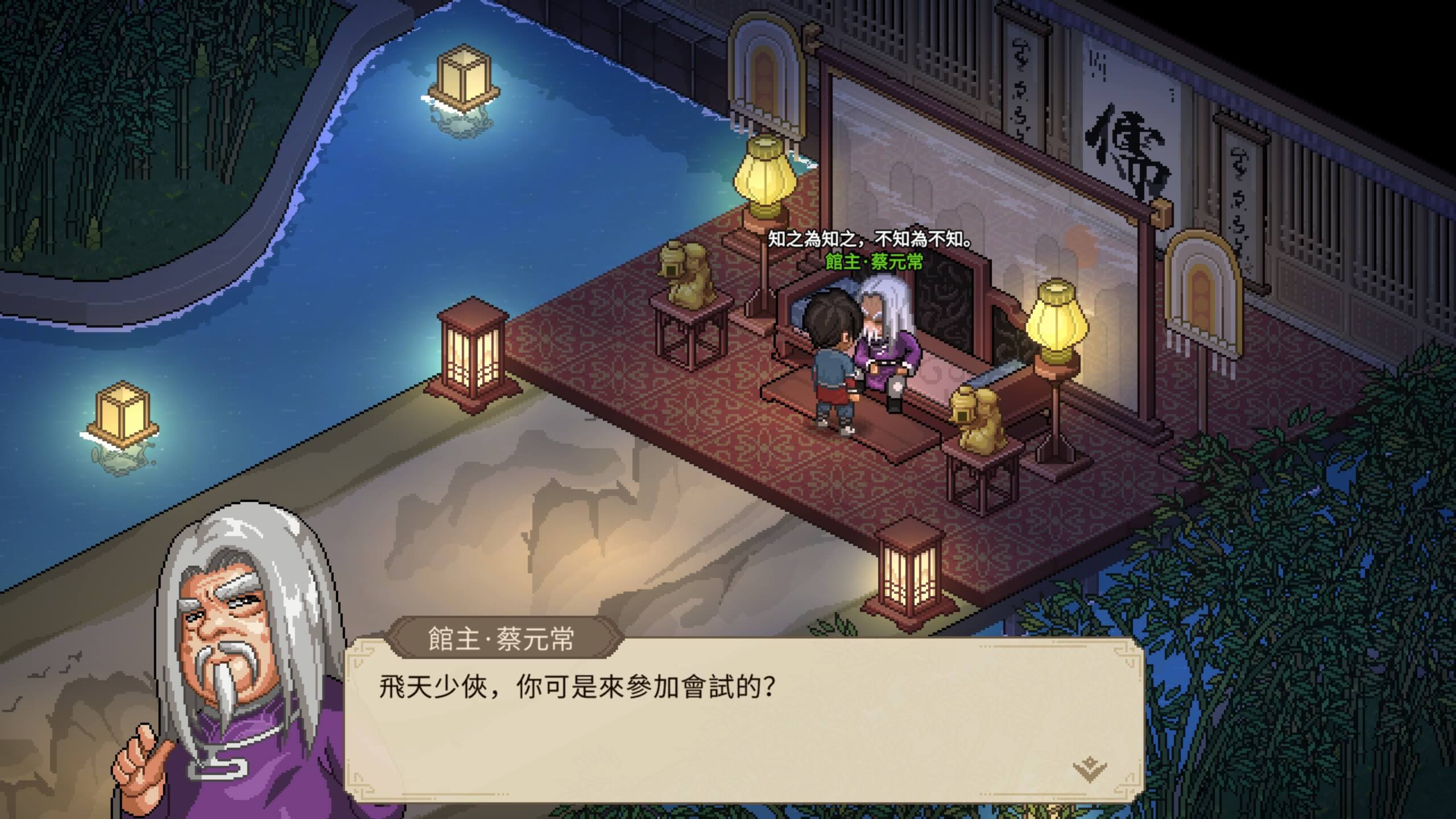
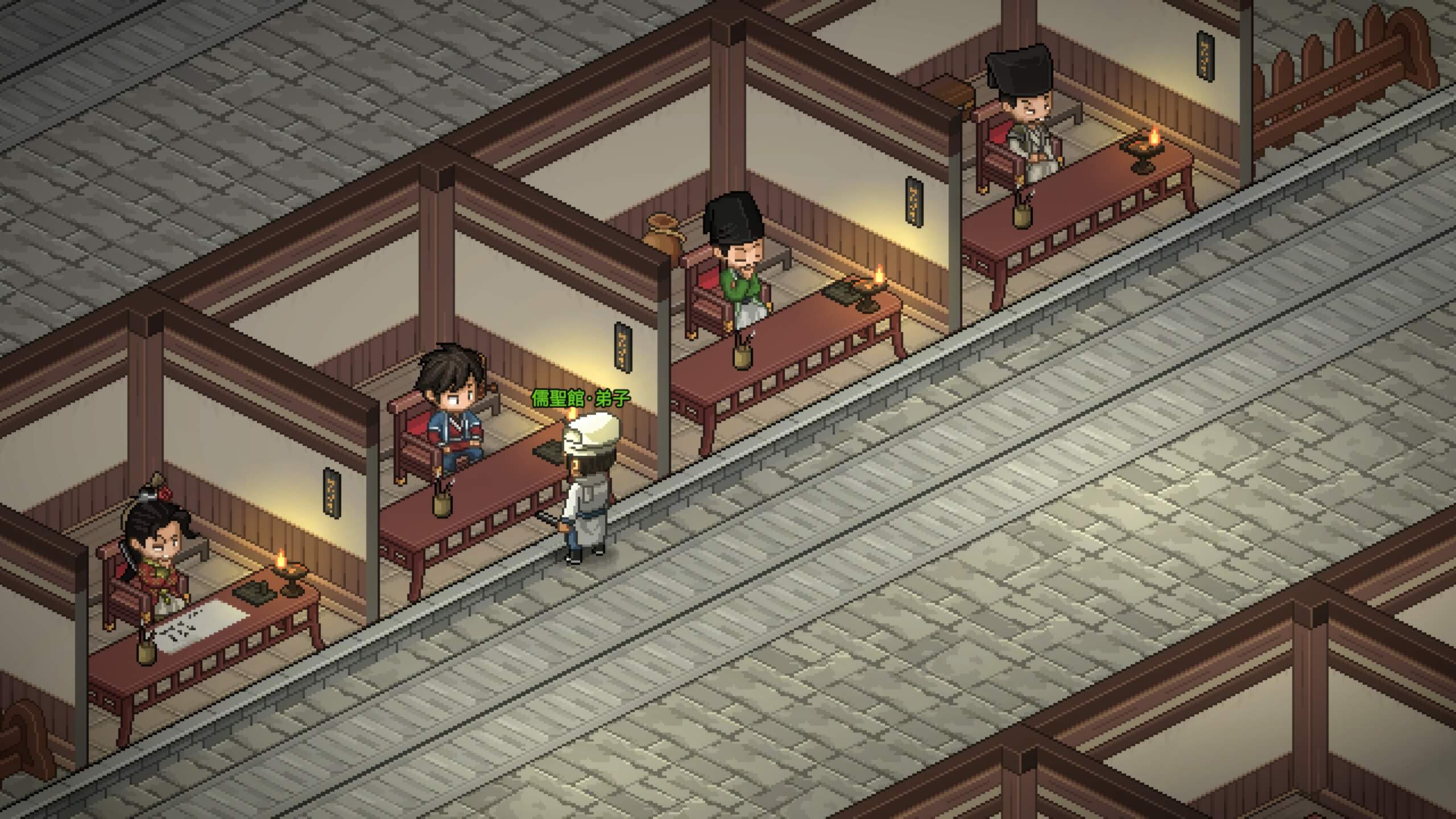
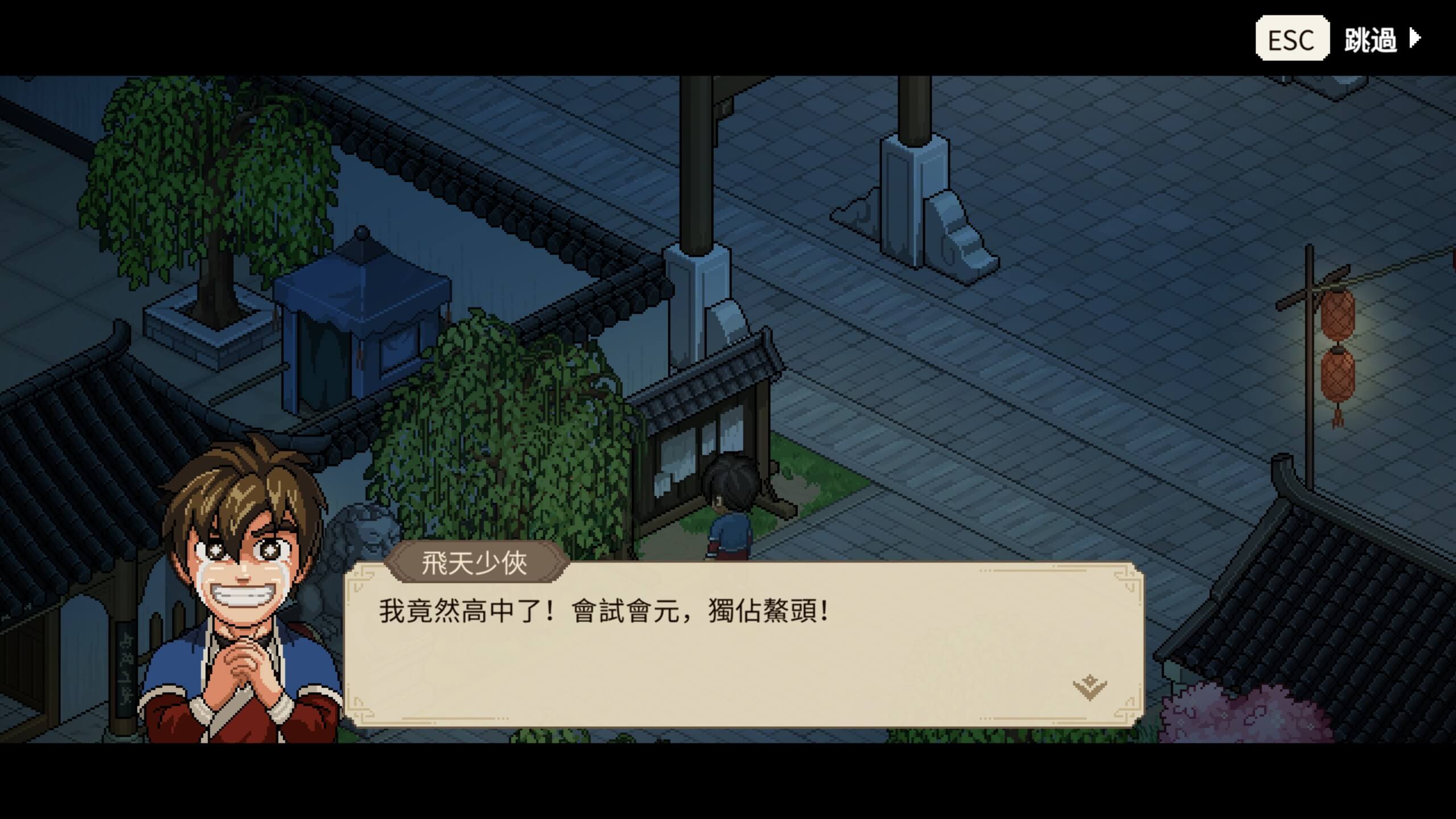
接著前往「行轅大營」解救被囚禁的皇帝完成任務後取得「狀元」達成成就
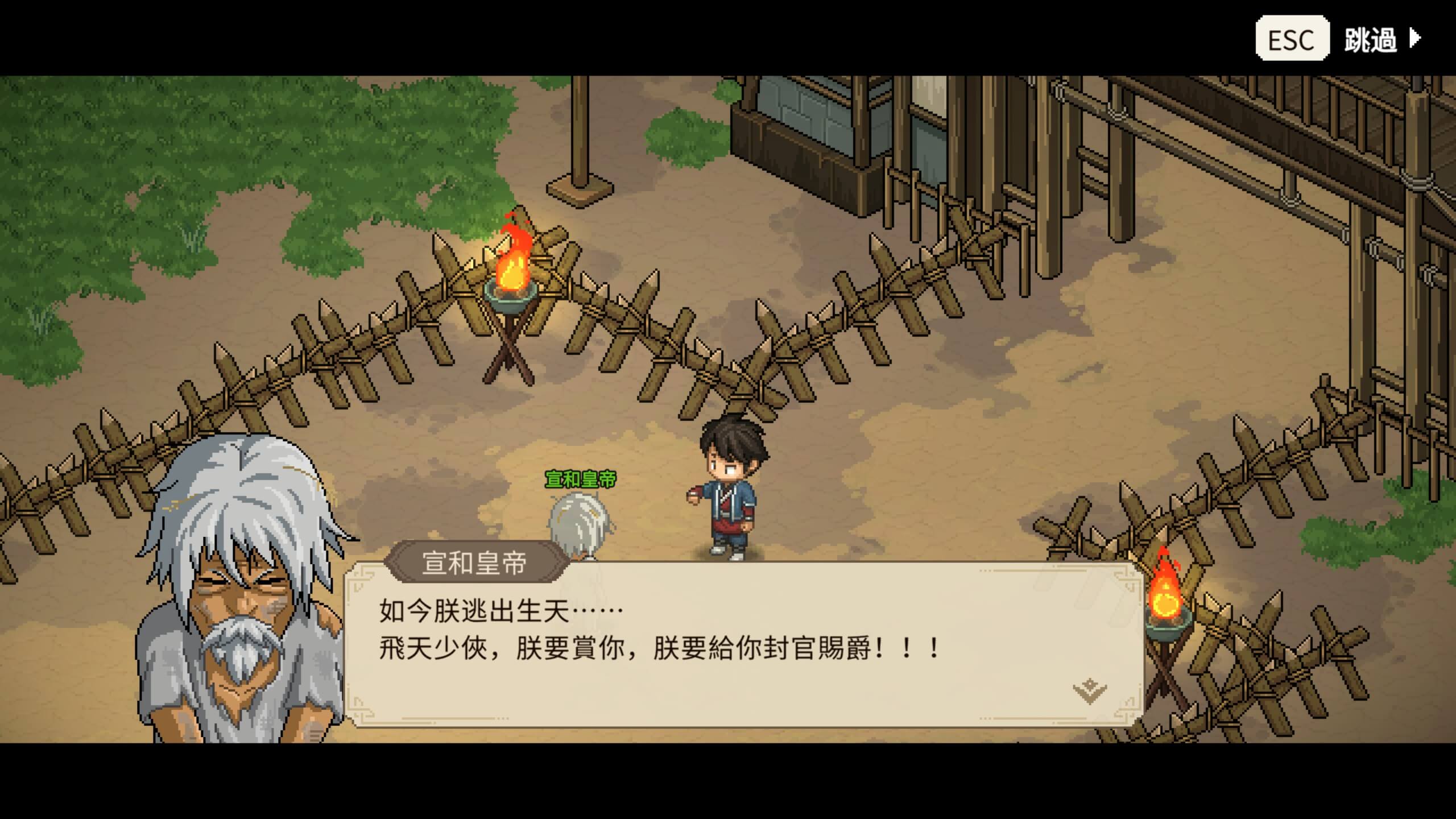
題庫
楚襄城 隆中書院老學究
Q: 人之初,性本善的下一句是什麼? A: 性相近,習相遠。(選項1)
Q: 人法地,地法天,ˍˍˍ,ˍˍˍ A: 天法道,道法自然。(選項4)
Q: 三才者,天地人。的下一句是什麼? A: 三光者,日月星。(選項1)
Q: 上善若水,水善ˍˍˍˍˍˍ A: 利萬物而不爭。(選項1)
Q: 山不厭高,海不厭深的下一句是什麼? A: 周公吐哺,天下歸心。(選項3)
Q: 不積跬步,無以至千裏的下一句是什麼? A: 不積小流,無以成江海。(選項3)
Q: 天地不仁,以萬物為芻狗的下一句是什麼? A: 聖人不仁,以百姓為芻狗。(選項4)
Q: 日月之行,若出其中的下一句是什麼? A: 星漢燦爛,若出其裏。(選項2)
Q: 玉不琢,不成器的下一句是什麼? A: 人不學,不知義。(選項2)
Q: 合抱之木,生於毫末;九層之臺,起於累土的下一句是什麼? A: 千里之行,始於足下。(選項3)
Q: 老吾老,以及人之老的下一句是什麼? A: 幼吾幼,以及人之幼。(選項2)
Q: 君子和而不同的下一句是什麼? A: 小人同而不和。(選項3)
Q: 君子坦蕩蕩的下一句是什麼? A: 小人長慼慼。(選項2)
Q: 長江後浪推前浪的下一句是什麼? A: 世上新人趕舊人。(選項3)
Q: 教之道,貴以專的上一句是什麼? A: 苟不教,性乃遷。(選項4)
Q: 智者上善若水,海納百川的下一句是什麼? A: 仁者高山仰止,厚德載物。(選項3)
Q: 畫虎畫皮難畫骨的下一句是什麼? A: 知人知面不知心。(選項2)
Q: 路遙知馬力的下一句是什麼? A: 日久見人心。(選項4)
Q: 運籌帷帳中的下一句是什麼? A: 決勝千里外。(選項1)
Q: 窮則獨善其身的下一句是什麼? A: 達則兼善天下。(選項3)
Q: 養不教,父之過。的下一句是什麼? A: 教不嚴,師之惰。(選項1)
Q: 儒以文亂法的下一句是什麼? A: 俠以武犯禁。(選項2)
Q: 學而不思則罔的下一句是什麼? A: 思而不學則殆。(選項1)
Q: 融四歲,能讓梨。的下一句是什麼? A: 悌於長,宜先知。(選項3)
Q: 關關雎鳩,在河之洲的下一句是什麼? A: 窈窕淑女,君子好逑。(選項3)
院試
Q: 「井蛙不可以語於海者,拘於虛也」的下一句是什麼? A: 夏蟲不可以語於冰者,篤於時也。(選項3)
Q: 「酒逢知己千杯少」的下一句是什麼? A: 話不投機半句多。(選項4)
Q: 「知人者智,自知者明」的下一句是什麼? A: 勝人者有力,自勝者強。(選項1)
Q: 「不自見,故明」的下一句是什麼? A: 不自是,故彰。(選項4)
Q: 「積土成山,風雨興焉」的下一句是什麼? A: 積水成淵,蛟龍生焉。(選項4)
Q: 「鍥而舍之,朽木不折」的下一句是什麼? A: 鍥而不捨,金石可鏤。(選項2)
Q: 「不登高山,不知天之高也」的下一句是什麼? A: 不臨深溪,不知地之厚也。(選項1)
Q: 「良農不為水旱不耕」的下一句是什麼? A: 良賈不為折閱不市。(選項3)
Q: 「歲不寒,無以知松柏」的下一句是什麼? A: 事不難,無以知君子。(選項4)
Q: 「士為知己者死」的下一句是什麼? A: 女為悅己者容。(選項2)
Q: 「竭澤而漁,豈不獲得?而明年無魚」的下一句是什麼? A: 焚藪而田,豈不獲得?而明年無獸。(選項3)
Q: 「得十良馬,不若得一伯樂」的下一句是什麼? A: 得十良劍,不若得一歐冶。(選項3)
Q: 「非淡泊無以明志」的下一句是什麼? A: 非寧靜無以致遠。(選項1)
Q: 「香餌之下,必有懸魚」的下一句是什麼? A: 重賞之下,必有死夫。(選項2)
Q: 「積善三年,知之者少」的下一句是什麼? A: 為惡一日,聞於天下。(選項1)
大梁太學館對聯
Q: 請接下聯:一花一佛一世界; A: 三摩三藐三菩提。(選項2)
Q: 請接下聯:一門父子三抔土; A: 兩世文章百代春。(選項3)
Q: 請接下聯:人中騏驥馳千里; A: 海內鯤鵬舉九天。(選項2)
Q: 請接下聯:人生哪能多如意; A: 萬事只求半稱心。(選項4)
Q: 請接下聯:三教九流同歸大道; A: 千巖萬壑合成奇觀。(選項1)
Q: 請接下聯:千秋筆墨驚天地; A: 萬里雲山入畫圖。(選項3)
Q: 請接下聯:大肚能容容天下難容之事; A: 開口便笑笑世間可笑之人。(選項2)
Q: 請接下聯:天上何曾有山水; A: 人間豈不是神仙。(選項4)
Q: 請接下聯:太平本是將軍定; A: 不許將軍見太平。(選項2)
Q: 請接下聯:少水沙即現; A: 是土堤方成。(選項1)
Q: 請接下聯:手提三尺龍泉劍; A: 不斬奸邪誓不休。(選項1)
Q: 請接下聯:水底月; A: 鏡中花。(選項1)
Q: 請接下聯:水底月如天上月; A: 眼中人是面前人。(選項4)
Q: 請接下聯:水從碧玉環中去; A: 人在蒼龍背上行。(選項1)
Q: 請接下聯:仗義每多屠狗輩; A: 負心多是讀書人。(選項3)
Q: 請接下聯:古今奇觀屬巖壑; A: 往來名士盡風流。(選項2)
Q: 請接下聯:玉可碎而不可改其白; A: 竹可焚而不可毀其節。(選項2)
Q: 請接下聯:好書不厭看還讀; A: 益友何妨去復來。(選項1)
Q: 請接下聯:有山皆圖畫; A: 無水不文章。(選項2)
Q: 請接下聯:有緣千裏來相會; A: 無緣對面不相逢。(選項1)
Q: 請接下聯:老驥伏櫪志千里; A: 短錐處囊半寸鋒。(選項2)
Q: 請接下聯:自古驕兵多致敗; A: 從來輕敵少成功。(選項2)
Q: 請接下聯:行止無愧天地; A: 褒貶自有春秋。(選項2)
Q: 請接下聯:良禽擇木而棲; A: 賢臣擇主而事。(選項3)
Q: 請接下聯:身是菩提樹; A: 心如明鏡臺。(選項2)
Q: 請接下聯:抽刀斷水水更流; A: 舉杯消愁愁更愁。(選項2)
Q: 請接下聯:東南西北; A: 春夏秋冬。(選項2)
Q: 請接下聯:青山不墨千秋畫; A: 綠水無弦萬古琴。(選項3)
Q: 請接下聯:既聞山石無假色; A: 亦知草木有真香。(選項1)
Q: 請接下聯:美酒千杯成知已; A: 清茶一盞能醉人。(選項2)
Q: 請接下聯:風調雨順; A: 國泰民安。(選項2)
Q: 請接下聯:風聲雨聲讀書聲聲聲入耳; A: 家事國事天下事事事關心。(選項3)
Q: 請接下聯:海納百川,有容乃大; A: 壁立千仞,無欲則剛。(選項1)
Q: 請接下聯:海闊憑魚躍; A: 天高任鳥飛。(選項1)
Q: 請接下聯:馬逢伯樂而嘶; A: 人遇知己而死。(選項1)
Q: 請接下聯:問青牛何人騎去; A: 有黃鶴自天飛來。(選項2)
Q: 請接下聯:清風有意難留我; A: 明月無心自照人。(選項1)
Q: 請接下聯:猛虎一杯山中醉; A: 蛟龍兩盞海底眠。(選項2)
Q: 請接下聯:理想莫享醴。 A: 前途弗圖錢。(選項1)
Q: 請接下聯:莫對青山談世事; A: 休將文字佔時名。(選項3)
Q: 請接下聯:雲無心以出岫; A: 鳥倦飛而知還。(選項4)
Q: 請接下聯:萬山拜其下; A: 孤雲臥此中。(選項3)
Q: 請接下聯:福無雙至今朝至; A: 禍不單行昨夜行。(選項2)
Q: 請接下聯:廟小無僧風掃地; A: 天高有佛月點燈。(選項4)
Q: 請接下聯:課子課孫先課己; A: 成仙成佛且成人。(選項3)
Q: 請接下聯:養天地正氣; A: 法古今完人。(選項3)
Q: 請接下聯:燕雀安知鴻鵠志; A: 鯤鵬反笑鷽鳩言。(選項4)
Q: 請接下聯:雞飢爭豆鬥; A: 鼠暑上樑涼。(選項3)
Q: 請接下聯:寶劍鋒從磨礪出; A: 梅花香自苦寒來。(選項3)
Q: 請接下聯:靄靄墓門雲氣鎖; A: 森森陵木雨聲中。(選項1)
鄉試
Q: 「雲想衣裳花想容」的下一句是什麼? A: 春風拂檻露華濃。(選項3)
Q: 「仰天大笑出門去」的下一句是什麼? A: 我輩豈是蓬蒿人。(選項4)
Q: 「十步殺一人」的下一句是什麼? A: 千里不留行。(選項2)
Q: 「今人不見古時月」的下一句是什麼? A: 今月曾經照古人。(選項1)
Q: 「天生我材必有用」的下一句是什麼? A: 千金散盡還復來。(選項3)
Q: 「故人西辭黃鶴樓」的下一句是什麼? A: 煙花三月下揚州。(選項2)
Q: 「舉杯邀明月」的下一句是什麼? A: 對影成三人。(選項4)
Q: 「人生得意須盡歡」的下一句是什麼? A: 莫使金樽空對月。(選項3)
Q: 「事了拂衣去」的下一句是什麼? A: 深藏身與名。(選項3)
Q: 「曾經滄海難為水」的下一句是什麼? A: 除卻巫山不是雲。(選項2)
Q: 「射人先射馬」的下一句是什麼? A: 擒賊先擒王。(選項1)
Q: 「出師未捷身先死」的下一句是什麼? A: 長使英雄淚滿襟。(選項3)
Q: 「兩個黃鸝鳴翠柳」的下一句是什麼? A: 一行白鷺上青天。(選項2)
Q: 「窗含西嶺千秋雪」的下一句是什麼? A: 門泊東吳萬里船。(選項3)
Q: 「春宵一刻值千金」的下一句是什麼? A: 花有清香月有陰。(選項2)
Q: 「空山新雨後」的下一句是什麼? A: 天氣晚來秋。(選項4)
Q: 「勸君更盡一杯酒」的下一句是什麼? A: 西出陽關無故人。(選項3)
Q: 「大漠孤煙直」的下一句是什麼? A: 長河落日圓。(選項1)
Q: 「二十四橋明月夜」的下一句是什麼? A: 玉人何處教吹簫。(選項2)
Q: 「一騎紅塵妃子笑」的下一句是什麼? A: 無人知是荔枝來。(選項1)
Q: 「清明時節雨紛紛」的下一句是什麼? A: 路上行人欲斷魂。(選項1)
Q: 「折戟沉沙鐵未銷」的下一句是什麼? A: 自將磨洗認前朝。(選項2)
Q: 「借問酒家何處有」的下一句是什麼? A: 牧童遙指杏花村。(選項1)
Q: 「夜闌臥聽風吹雨」的下一句是什麼? A: 鐵馬冰河入夢來。(選項3)
Q: 「垂死病中驚坐起」的下一句是什麼? A: 暗風吹雨入寒窗。(選項3)
Q: 「取次花叢懶回顧」的下一句是什麼? A: 半緣修道半緣君。(選項2)
Q: 「白髮悲明鏡」的下一句是什麼? A: 青春換敝裘。(選項4)
Q: 「紅豆生南國」的下一句是什麼? A: 春來發幾枝。(選項1)
Q: 「春風十里揚州路」的下一句是什麼? A: 捲上珠簾總不如。(選項3)
Q: 「勸君莫惜金縷衣」的下一句是什麼? A: 勸君惜取少年時。(選項2)
會試
Q: 「山有木兮木有枝」的下一句是什麼? A: 心悅君兮君不知。(選項2)
Q: 「南朝四百八十寺」的下一句是什麼? A: 多少樓臺煙雨中。(選項3)
Q: 「位卑未敢忘憂國」的下一句是什麼? A: 事定猶須待闔棺。(選項3)
Q: 「五花馬,千金裘的下一句是什麼? A: 呼兒將出換美酒。(選項4)
Q: 「左牽黃,右擎蒼」的下一句是什麼? A: 錦帽貂裘,千騎卷平岡。(選項2)
Q: 「大鵬一日同風起」的下一句是什麼? A: 扶搖直上九萬裏。(選項1)
Q: 「合抱之木,生於毫末;九層之臺,起於累土;千里之行,始於足下。 」出自哪位先哲之口? A: 老子。(選項2)
Q: 「上善若水,水善利萬物而不爭。」出自哪位先哲之口? A: 老子。(選項2)
Q: 「人生天地之間,若白駒之過隙,忽然而已。」出自哪位先哲之口? A: 莊子。(選項2)
Q: 「君子坦蕩蕩,小人長慼慼。」出自哪本典籍? A: 《論語》。(選項1)
Q: 「窮則獨善其身,達則兼善天下。」出自哪本典籍? A: 《孟子》。(選項3)
Q: 「學而不思則罔,思而不學則殆。」出自哪本典籍? A: 《論語》。(選項1)
Q: 請接下聯:「自古雄才多磨難;」 A: 從來紈絝少偉男。(選項3)
Q: 請接下聯:「人情閱盡秋雲厚;」 A: 世事經多蜀道平。(選項3)
Q: 請接下聯:「術業宜從勤學起;」 A: 韶華不為少年留。(選項3)
Q: 請接下聯:「詩書非藥能醫俗;」 A: 道德無根可樹人。(選項2)
Q: 請接下聯:「室雅何須大;」 A: 花香不在多。(選項4)
Q: 請接下聯:「書畫琴棋藝輝百代;」 A: 詩詞歌賦文啟千秋。(選項3)
Q: 「鳥之將死,其鳴也哀;」的下一句是什麼? A: 人之將死,其言也善。(選項3)
Q: 「名不正,則言不順;」的下一句是什麼? A: 言不順,則事不成。(選項4)
Q: 「其身正,不令而行;」的下一句是什麼? A: 其身不正,雖令不從。(選項2)
Q: 「君子懷德,小人懷土;」的下一句是什麼? A: 君子懷刑,小人懷惠。(選項2)
Q: 「三人行,必有我師焉;」的下一句是什麼? A: 擇其善者而從之,其不善者而改之。(選項1)
Q: 「不患寡而患不均;」的下一句是什麼? A: 不患貧而患不安。(選項1)
Q: 「天下熙熙,皆為利來;」的下一句是什麼? A: 天下攘攘,皆為利往。(選項1)
Q: 「智者千慮,必有一失;」的下一句是什麼? A: 愚者千慮,必有一得。(選項3)
Q: 「彊弩之極,矢不能穿魯縞;」的下一句是什麼? A: 衝風之末,力不能漂鴻毛。(選項2)
Q: 「天時不如地利;」的下一句是什麼? A: 地利不如人和。(選項1)
Q: 「夫人必自侮,然後人侮之;」的下一句是什麼? A: 家必自毀,而後人毀之。(選項2)
Q: 「博學之,審問之,ˍˍˍ,ˍˍˍ,ˍˍˍ。」 A: 慎思之,明辨之,篤行之。(選項3)
端午節
霖安城太白樓
Q: 端午節不是為了紀念哪位歷史名人? A: 楚莊王。(選項3)
Q: 端午節一般流行吃什麼? A: 吃粽子。(選項1)
Q: 有哪個活動不是端午節的傳統習俗? A: 登高採菊。(選項3)
Q: 端午節小孩佩戴香囊的意義是什麼? A: 驅邪避瘟。(選項4)
Q: 大梁城的粽子是什麼口味? A: 甜味。(選項2)
楚襄城忘憂樓
Q: 端午節是哪一天? A: 農曆五月初五。(選項4)
Q: 哪個不是端午節的別稱? A: 六月節。(選項3)
Q: 端午節的端字在這裏是什麼意思? A: 開端。(選項2)
Q: 霖安城的粽子是什麼口味? A: 鹹味。(選項1)
Q: 端午節除五毒,蛇、蠍、蜈蚣、蟾蜍還包括什麼? A: 壁虎。(選項1)
大梁城繁花似錦樓
Q: 古人端午節塗飲雄黃酒的意義是? A: 驅邪避瘟。(選項3)
Q: 楚襄城的粽子是什麼口味? A: 都不是。(選項4)
Q: 四大傳統節日是哪幾個? A: 春節 清明 端午 中秋。(選項2)
Q: 端午節最早是由上古時代哪個圖騰祭祀演變而來? A: 龍。(選項2)
Q: 端午節佈置的可驅邪祛病的花草是什麼? A: 艾草。(選項3)
儒聖館
看門者
Q: 請接下聯:清風明月本無價; A: 近水遠山皆有情。(選項2)
Q: 請接下聯:棋逢敵手難相勝; A: 將遇良才不敢驕。(選項2)
Q: 請接下聯:門有古松庭無亂石; A: 秋宜明月春則和風。(選項1)
Q: 請接下聯:掬水月在手; A: 弄花香滿衣。(選項3)
文人鬧場
Q: 請接下聯:一羊引雙羔。 A: 兩豬共一槽。(選項4)
Q: 請接下聯:二三四五。 A: 六七八九。(選項3)
Q: 請接下聯:人曾是僧,人弗能成佛? A: 禾火為秋,禾日曬成香。(選項1)
Q: 請接下聯:大肚能容,容天下難容之事。 A: 開口便笑,笑世間可笑之人。(選項4)
Q: 請接下聯:天作棋盤星作子,日月爭光。 A: 雷為戰鼓電為旗,風雲際合。(選項2)
Q: 請接下聯:天空明月三千界。 A: 人醉春風十二樓。(選項1)
Q: 請接下聯:天空明月三千界。 A: 人醉春風十二樓。(選項4)
Q: 請接下聯:天增歲月人增壽。 A: 春滿乾坤福滿堂。(選項2)
Q: 請接下聯:水底月為天上月。 A: 眼中人是面前人。(選項3)
Q: 請接下聯:冬蟲夏草九重皮。 A: 玉葉金花一條根。(選項4)
Q: 請接下聯:未老思閣老。 A: 無才做秀才。(選項1)
Q: 請接下聯:玉燕迎春春常到。 A: 金雀報喜喜迎門。(選項4)
Q: 請接下聯:因荷而得藕。 A: 有杏不須梅。(選項3)
Q: 請接下聯:此木為柴山山出。 A: 因火成煙夕夕多。(選項3)
Q: 請接下聯:門對千根竹。 A: 家藏萬卷書。(選項2)
Q: 請接下聯:青山有幸埋忠骨。 A: 白鐵無辜鑄佞臣。(選項3)
Q: 請接下聯:昨日鑽狗洞偷桃,不知是誰? A: 他年步蟾宮攀桂,必定有我。(選項3)
Q: 請接下聯:草堂留後世。 A: 詩聖著千秋。(選項4)
Q: 請接下聯:無錫錫山山無錫。 A: 黃河河套套黃河。(選項2)
Q: 請接下聯:菊花金秋傲霜。 A: 梅花隆冬鬥雪。(選項2)
Q: 請接下聯:塔樓亮燈,層層孔明。 A: 荷塘摳藕,節節太白。(選項1)
Q: 請接下聯:新年納餘慶。 A: 佳節號長春。(選項4)
Q: 請接下聯:萬戶春燈報元夜。 A: 一天瑞雪兆豐年。(選項4)
Q: 請接下聯:萬里河山鋪錦繡。 A: 滿城笙管樂太平。(選項2)
Q: 請接下聯:萬家燈火同秋月。 A: 大地光明不夜天。(選項2)
Q: 請接下聯:綠水本無憂,因風皺面。 A: 青山原不老,為雪白頭。(選項1)
Q: 請接下聯:綠水本無憂,因風皺面。 A: 青山原不老,為雪白頭。(選項1)
Q: 請接下聯:綠綠紅紅處處鶯鶯燕燕。 A: 花花草草年年暮暮朝朝。(選項4)
Q: 請接下聯:蠶為天下蟲。 A: 鴻是江邊鳥。(選項3)
答疑解惑
Q: 一日三秋的秋是什麼意思? A: 是指一年中的秋天。(選項4)
Q: 一日不見如隔三秋的秋是什麼意思? A: 是指一年中的秋天。(選項3)
Q: 一日之計在於晨的晨是什麼意思? A: 清晨。(選項4)
Q: 一字千金的金是什麼意思? A: 錢財或者價值。(選項2)
Q: 一衣帶水的水是什麼意思? A: 江河湖海。(選項2)
Q: 一花一世界的花是什麼意思? A: 任何一朵花。(選項1)
Q: 一鼓作氣的鼓是什麼意思? A: 戰鼓。(選項1)
Q: 一鳴驚人的鳴是什麼意思? A: 叫聲或者聲音。(選項3)
Q: 人無遠慮必有近憂的慮是什麼意思? A: 考慮或者思考。(選項3)
Q: 三國演義中的三國是哪三個國家? A: 魏國、蜀國和吳國。(選項1)
Q: 三從四德中的三從是什麼? A: 婦女要從父、從夫、從子。(選項2)
Q: 三顧茅廬的茅廬是誰的住所? A: 諸葛亮的住所。(選項3)
Q: 千里之行始於足下出自哪本書? A: 出自《老子》。(選項2)
Q: 不入虎穴焉得虎子的穴是什麼意思? A: 巢穴。(選項3)
Q: 中秋節吃月餅的來歷是什麼? A: 紀念反抗元朝的起義訊號。(選項2)
Q: 元宵節為什麼要吃湯圓? A: 象徵團圓和和諧。(選項1)
Q: 四書五經中的四書是哪四本書? A: 《大學》《中庸》《論語》《孟子》。(選項1)
Q: 四海之內皆兄弟的海是什麼意思? A: 天下或者世界。(選項2)
Q: 白日放歌須縱酒的作者是誰? A: 杜甫。(選項3)
Q: 百聞不如一見的見是什麼意思? A: 看見或者目睹。(選項3)
Q: 來而不往非禮也是什麼意思? A: 收到別人禮物而不回禮,會不禮貌。(選項1)
Q: 杯弓蛇影的杯是什麼意思? A: 酒杯。(選項4)
Q: 臥薪嚐膽的薪是什麼意思? A: 柴火。(選項2)
Q: 春節起源於什麼朝代 A: 殷商時期。(選項4)
Q: 春蠶到死絲方盡的絲是什麼意思? A: 蠶絲。(選項4)
Q: 桃李不言下自成蹊的桃李是什麼意思? A: 桃樹和李樹。(選項2)
Q: 破釜沉舟的釜是什麼意思? A: 鍋。(選項2)
Q: 畫龍點睛的睛是什麼意思? A: 眼睛。(選項4)
Q: 端午節為什麼要佩戴香包? A: 能夠驅蚊避邪。(選項1)
Q: 端午節為什麼要賽龍舟? A: 紀念屈原投江自盡。(選項3)
Q: 鄭人買履的履是什麼意思? A: 是指鞋子。(選項3)
Q: 獨樂樂不如眾樂樂的樂樂是什麼意思? A: 是指欣賞音樂的快樂。(選項2)
蔡攸之吟詩作對
Q: 一身轉戰三千裏, A: 一劍曾當百萬師。(選項2)
Q: 一笑出門去, A: 千里落花風。(選項2)
Q: 一簫一劍平生意, A: 負盡狂名十五年。(選項2)
Q: 人生得意須盡歡, A: 莫使金樽空對月。(選項2)
Q: 大鵬一日同風起, A: 扶搖直上九萬裏。(選項1)
Q: 小舟從此逝, A: 江海寄餘生。(選項3)
Q: 天下風雲出我輩, A: 一入江湖歲月催。(選項2)
Q: 天生我材必有用, A: 千金散盡還復來。(選項4)
Q: 天地風塵三尺劍, A: 江湖歲月一篇詩。(選項1)
Q: 少年恃險若平地, A: 獨倚長劍凌清秋。(選項2)
Q: 仗劍行千里, A: 微軀敢一言。(選項2)
Q: 君子死知己, A: 提劍出燕京。(選項2)
Q: 沖天香陣透長安, A: 滿城盡帶黃金甲。(選項3)
Q: 男兒何不帶吳鉤, A: 收取關山五十州。(選項1)
Q: 京華結交盡奇士, A: 意氣相期共生死。(選項3)
Q: 按劍清八極, A: 歸酣歌大風。(選項4)
Q: 流星白羽腰間插, A: 劍花秋蓮光出匣。(選項1)
Q: 桃李春風一杯酒, A: 江湖夜雨十年燈。(選項2)
Q: 桃花尋劍客, A: 不語笑春風。(選項3)
Q: 起舞蓮花劍, A: 行歌明月弓。(選項3)
Q: 孰知不向邊庭苦, A: 縱死猶聞俠骨香。(選項4)
Q: 登高壯觀天地間, A: 大江茫茫去不還。(選項2)
Q: 飲馬渡秋水, A: 水寒風似刀。(選項3)
Q: 黃沙百戰穿金甲, A: 不破樓蘭終不還。(選項2)
Q: 會當凌絕頂, A: 一覽眾山小。(選項3)
Q: 塵世如潮人如水, A: 只嘆江湖幾人回。(選項2)
Q: 滿堂花醉三千客, A: 一劍霜寒十四州。(選項1)
Q: 滿船明月從此去, A: 本是江湖寂寞人。(選項1)
Q: 瀟灑江湖十過秋, A: 酒杯無日不遲留。(選項1)
Q: 鯨飲未吞海, A: 劍氣已橫秋。(選項3)
其他
啞巴老太太猜字
Q: 一大二小 A: 奈(選項4)
Q: 一月七日 A: 脂(選項2)
Q: 一箭穿心 A: 必(選項2)
Q: 人不在其位 A: 立(選項3)
Q: 上下串通 A: 卡(選項2)
Q: 千言萬語 A: 夠(選項2)
Q: 山外青山 A: 出(選項4)
Q: 手無寸鐵 A: 控(選項1)
Q: 兄弟姐妹 A: 捉(選項1)
Q: 失其心也 A: 共(選項1)
Q: 旭日東昇 A: 九(選項1)
Q: 皇帝新裝 A: 襲(選項4)
Q: 格外大方 A: 回(選項3)
Q: 揮手告別 A: 軍(選項4)
Q: 遷來一口 A: 適(選項3)
英文版本試題
Q: What is the next line after "At the beginning, human nature is good"?
A: Nature is close, habit is far. (option 1)
Q: What is the line before "The way of teaching, value in focus"?
A: If not taught, nature will change. (option 4)
Q: What is the next line after "Jade, if not polished, does not become a tool"?
A: If a person does not learn, he does not know righteousness. (option 2)
Q: What is the next line after "The ospreys cry, on the islet in the river"?
A: A lady of grace, Gentleman's Courtship. (option 3)
Q: "The highest good is like water, water is good at ˍˍˍˍˍˍ"
A: Benefits all things and does not compete. (option 1)
Q: What is the next line after "A tree as big as a man's embrace grows from a tiny shoot; A nine-storied tower rises from a heap of earth"?
A: A thousand-mile journey begins with a single step. (option 3)
Q: What is the next line after "Honorable and yet different"?
A: The petty man agrees but does not harmonize. (option 3)
Q: "Man follows the earth, the earth follows the heaven, ˍˍˍ, ˍˍˍˍ"
A: The way of heaven is the way of nature. (option 4)
Q: What is the next line after "The mountain does not tire of height; the ocean does not tire of depth"?
A: Duke Zhou fed the people, and all hearts turned to him. (option 3)
Q: What is the next line after "The movement of the sun and the moon is as if it were among them"?
A: The stars in the sky are brilliant, as if they come from within. (option 2)
Q: What is the next line after "Honorable and magnanimous"?
A: The petty man is always worried. (option 2)
Q: What is the next line after "Learning without thought is labor lost"?
A: To think without learning is dangerous. (option 1)
Q: What is the next line after "Confucianists confuse the law with their writings"?
A: A hero uses martial arts to break the law. (option 2)
Q: What is the next line after "A long journey tests a horse's strength"?
A: Time reveals a person's heart. (option 4)
Q: What is the next line after "The waves behind drive on those before"?
A: New people in the world replace the old. (option 3)
Q: What is the next line after "Planning behind the curtain"?
A: Win a thousand miles away. (option 1)
Q: What is the next line after "In poverty, one focuses on self-improvement"?
A: If you are successful, you are kind to the world. (option 3)
Q: What is the next line after "Cruel World, treating all things as straw dogs"?
A: The sage is not benevolent, treating the people as straw dogs. (option 4)
Q: What is the next line after "It's easy to paint the skin of a tiger, but not its bones"?
A: Know a person's face, but not their heart. (option 2)
Q: What is the next line after "A journey of a thousand miles begins with a single step"?
A: If you don't accumulate small streams, you can't form rivers and seas. (option 3)
Q: What is the next line after "If a father does not teach his son, he is to blame"?
A: If the teaching is not strict, the teacher is lazy. (option 1)
Q: What is the next line after "At four years old, he could yield pears"?
A: Respect the elder, should know first. (option 3)
Q: What is the next line after "The three powers are heaven, earth and man"?
A: The three lights are the sun, the moon, and the stars. (option 1)
Q: What is the next line after "The wise man is as good as water, Great Ocean Manual"?
A: The benevolent person is like a high mountain, carrying heavy virtue. (option 3)
Q: What is the next line after "Respect the old, and extend it to others"?
A: I was young, as were others. (option 2)
Q: "What is the next sentence of 'The frog in the well cannot speak of the sea, because it is confined to the void'?"
A: The summer insect cannot speak to the ice, for they are bound by time. (option 3)
Q: "What is the next sentence of 'A thousand cups are too few when you meet an Intimate'?"
A: If words are not to the point, it is an abuse. (option 4)
Q: "What is the next sentence of 'He who knows others is wise, he who knows himself is enlightened'?"
A: The one who overcomes others is strong, the one who overcomes himself is powerful. (option 1)
Q: "What is the next sentence of 'Not seeing oneself, therefore enlightened'?"
A: Do not be self-righteous, thus you will shine. (option 4)
Q: "What is the next sentence of 'Piling up soil to form a mountain, wind and rain will rise'?"
A: Accumulate water to form a deep pool, and the dragon will be born there. (option 4)
Q: "What is the next sentence of 'Persist and give up, rotten wood will not break'?"
A: Persist without giving up, and even metal and stone can be carved. (option 2)
Q: "What is the next sentence of 'If you don't climb high mountains, you won't know how high the sky is'?"
A: Without standing by a deep stream, one cannot know the thickness of the earth. (option 1)
Q: "What is the next sentence of 'A good farmer does not stop plowing because of drought or flood'?"
A: A good merchant does not sell at a loss. (option 3)
Q: "What is the next sentence of 'If the year is not cold, you won't know the strength of the pine and cypress'?"
A: Without difficulty, one cannot know a gentleman. (option 4)
Q: "What is the next sentence of 'A gentleman dies for his Intimate'?"
A: A woman who pleases herself will be beautiful. (option 2)
Q: "What is the next sentence of 'Drain the pond to fish, won't you catch them? But next year there will be no fish'?"
A: Burning the bush to farm, isn't it profitable? But there will be no animals next year. (option 3)
Q: "What is the next sentence of 'Having ten good Horses is not as good as having one Bole'?"
A: Gaining ten good swords is not as good as gaining a blacksmith. (option 3)
Q: "What is the next sentence of 'Without indifference, there is no way to clarify your ambition'?"
A: Without tranquility, one cannot reach far. (option 1)
Q: "What is the next sentence of 'Under the fragrant bait, there must be a hanging fish'?"
A: Great rewards bring great risks. (option 2)
Q: "What is the next line of 'Three years of good deeds, known by few'?"
A: Commit evil for a day, and it will be heard throughout the world. (option 1)
Q: Please complete the couplet: Nurturing the righteous qi of heaven and earth;
A: Perfect people in ancient and modern times. (option 3)
Q: Please complete the couplet: A big belly can tolerate things that the world cannot tolerate;
A: Laugh at those who are laughable in the world with a word. (option 2)
Q: Please complete the couplet: How can a sparrow know the ambition of a swan;
A: The giant bird laughs at the dove's words. (option 4)
Q: Please complete the couplet: The body is a Buddha tree;
A: Heart like a clear mirror. (option 2)
Q: Please complete the couplet: An old horse in the stable still aspires to gallop a thousand miles;
A: Short awl in the bag, half-inch blade. (option 2)
Q: Please complete the couplet: Great Ocean Manual, tolerance is greatness;
A: A thousand-foot wall stands, desireless is firm. (option 1)
Q: Please complete the couplet: The sound of wind, rain, and reading enters the ears;
A: Family affairs, state affairs, world affairs, all affairs concern. (option 3)
Q: Please complete the couplet: A tiger drinks a cup and gets drunk in the mountains;
A: Two cups of dragon sleep at the bottom of the sea. (option 2)
Q: Please complete the couplet: All mountains bow down to it;
A: Lonely cloud lies here. (option 3)
Q: Please complete the couplet: Water flows from the jade ring;
A: People walk on the back of the dragon. (option 1)
Q: Please complete the couplet: Favorable wind and rain;
A: The country is prosperous and the people are at peace. (option 2)
Q: Please complete the couplet: The tomb door is locked by misty clouds;
A: Dense woods in the rain. (option 1)
Q: Please complete the couplet: Three generations of a family buried in the same soil;
A: Two generations of articles, a hundred generations of spring. (option 3)
Q: Please complete the couplet: Three religions and nine schools of thought all return to the great path;
A: A thousand rocks and ravines form a spectacle. (option 1)
Q: Please complete the couplet: Teach your children and grandchildren to first teach yourself;
A: Become an immortal or a Buddha, but first become a human. (option 3)
Q: Please complete the couplet: The sea is wide for fish to leap;
A: The sky is high and allows birds to fly. (option 1)
Q: Please complete the couplet: Among men, a fine horse can gallop a thousand miles;
A: A giant fish in the sea can reach the sky. (option 2)
Q: Please complete the couplet: Moon under the water;
A: Flowers in the mirror. (option 1)
Q: Please complete the couplet: East, South, West, North;
A: Spring, summer, autumn, and winter. (option 2)
Q: Please complete the couplet: Clouds mindlessly emerge from the mountains;
A: A bird knows when to return when it is tired of flying. (option 4)
Q: Please complete the couplet: Actions without shame under heaven and earth;
A: Praise and criticism have their own seasons. (option 2)
Q: Please complete the couplet: Heard that mountain stones have no false colors;
A: Even grass and trees have a true fragrance. (option 1)
Q: Please complete the couplet: Thousand autumns of ink and brush shock heaven and earth;
A: Clouds and mountains for miles are in the painting. (option 3)
Q: Please complete the couplet: Peace is originally set by the general;
A: The general is not allowed to see peace. (option 2)
Q: Please complete the couplet: Destined to meet from a thousand miles away;
A: People who are not destined to meet will not meet. (option 1)
Q: Please complete the couplet: The sharpness of a treasure sword comes from grinding;
A: The fragrance of plum blossoms comes from the bitter cold. (option 3)
Q: Please complete the couplet: Holding a three-foot Longquan sword;
A: Swear not to stop until the evil is cut down. (option 1)
Q: Please complete the couplet: Jade can be shattered but its whiteness cannot be changed;
A: Bamboo can be burned, but its joints cannot be destroyed. (option 2)
Q: Please complete the couplet: Good birds choose trees to nest;
A: A wise minister chooses his master. (option 3)
Q: Please complete the couplet: Proud soldiers often lead to defeat since ancient times;
A: Underestimating the enemy often leads to failure. (option 2)
Q: Please complete the couplet: Horse neighs when it meets a good master;
A: People die when they meet their loved ones. (option 1)
Q: Please complete the couplet: Draw a sword to cut water, water flows more;
A: Raise a cup to drown sorrows, but sorrows multiply. (option 2)
Q: Please complete the couplet: How can life always go as one wishes;
A: All things only need to be half satisfactory. (option 4)
Q: Please complete the couplet: Ideal not to enjoy the sweet wine.
A: Don't worry about money in the future. (option 1)
Q: Please complete the couplet: A thousand cups of fine wine become self-knowledge;
A: A cup of clear tea can intoxicate. (option 2)
Q: Please complete the couplet: One flower, one Buddha, one world;
A: Three times of meditation, three times of extinction, three times of Buddha. (option 2)
Q: Please complete the couplet: Blue Mountain does not ink a thousand autumn paintings;
A: The green water is a timeless zither without strings. (option 3)
Q: Please complete the couplet: Fortune comes twice, today it comes;
A: Misfortunes never come singly, they came last night. (option 2)
Q: Please complete the couplet: Ancient and modern wonders belong to the rocky gorges;
A: Famous people come and go, all are elegant. (option 2)
Q: Please complete the couplet: All mountains are paintings;
A: Without water, there is no literature. (option 2)
Q: Please complete the couplet: Good books are not tired of reading and re-reading;
A: Why not leave and return, my friend? (option 1)
Q: Please complete the couplet: Ask the green ox who rode away;
A: A yellow crane flies in from the sky. (option 2)
Q: Please complete the couplet: There are no mountains and rivers in the sky;
A: Isn't the world a place for immortals? (option 4)
Q: Please complete the couplet: The clear wind intends to keep me from staying;
A: The bright moon shines on people without intention. (option 1)
Q: Please complete the couplet: Don't discuss worldly affairs with Blue Mountain;
A: Don't use words to occupy your time. (option 3)
Q: Please complete the couplet: Less water reveals the sand;
A: It is the earth embankment that forms. (option 1)
Q: Please complete the couplet: The moon under the water is like the moon in the sky;
A: The person in the eye is the person in front. (option 4)
Q: Please complete the couplet: Righteous often slaughter the dog breed;
A: Those who betray often are scholars. (option 3)
Q: Please complete the couplet: Small temple without monks, wind sweeps the ground;
A: There is a Buddha in the high sky, lighting the moon. (option 4)
Q: Please complete the couplet: Hungry chickens fight for beans;
A: The rat feels cool on the beam. (option 3)
Q: "What is the next line of 'Clouds think of clothes, flowers think of faces'?"
A: The spring breeze brushes the railing, the dew is thick. (option 3)
Q: "What is the next line of 'Laughing to the sky, I walk out the door'?"
A: We are not ordinary people. (option 4)
Q: "What is the next line of 'Kill a man every ten steps'?"
A: Travel a thousand miles without leaving a trace. (option 2)
Q: "What is the next line of 'Today's people don't see the moon of ancient times'?"
A: The moon of today once shone on the ancients. (option 1)
Q: "What is the next line of 'I was born with talent, it must be useful'?"
A: Squandered fortune can still be regained. (option 3)
Q: "What is the next line of 'Old friend bids farewell to the Yellow Crane Tower'?"
A: Fireworks in March in Yangzhou. (option 2)
Q: "What is the next line of 'Raise a cup to invite the bright moon'?"
A: Three people in the reflection. (option 4)
Q: "What is the next line of 'One must enjoy life when one is successful'?"
A: Don't let the golden cup be empty under the moon. (option 3)
Q: "What is the next line of 'Having done the deed, I leave without a trace'?"
A: Hide your identity and name. (option 3)
Q: "What is the next line of 'Once having seen the vast ocean, one can't be content with a pond'?"
A: Except for Wushan, it's not a cloud. (option 2)
Q: "What is the next line of 'Shoot the man before shooting the horse'?"
A: To catch a thief, catch the king first. (option 1)
Q: "What is the next line of 'Died before the battle was won'?"
A: Always make heroes shed tears. (option 3)
Q: "What is the next line of 'Two orioles sing in the green willow'?"
A: A line of egrets ascends to the blue sky. (option 2)
Q: "What is the next line of 'The window contains the thousand autumns of the West Ridge'?"
A: A ship moored in the east of Wu, thousands of miles away. (option 3)
Q: "What is the next line of 'A moment of spring night is worth a thousand gold'?"
A: Flowers have fragrance, moon has shade. (option 2)
Q: "What is the next line of 'After the rain in the empty mountain'?"
A: The weather turns to autumn late. (option 4)
Q: "What is the next line of 'I urge you to drink another cup of wine'?"
A: There are no old friends after leaving Yangguan. (option 3)
Q: "What is the next line of 'The lonely smoke in the vast desert goes straight'?"
A: The long river sets the sun round. (option 1)
Q: "What is the next line of 'Twenty-four bridges on a bright moonlit night'?"
A: Where does the jade person teach flute playing? (option 2)
Q: "What is the next line of 'A horseman in the red dust makes the princess laugh'?"
A: No one knows it's litchi coming. (option 1)
Q: "What is the next line of 'Rain pours down during the Qingming Festival'?"
A: Travelers on the road are heartbroken. (option 1)
Q: "What is the next line of 'The broken spear sinks into the sand, the iron is not yet destroyed'?"
A: Recognize the previous dynasty by washing and grinding. (option 2)
Q: "What is the next line of 'Where is the tavern, I ask'?"
A: The shepherd boy points to the apricot flower village from afar. (option 1)
Q: "What is the next line of 'In the dead of night, I listen to the wind and rain'?"
A: Iron Horse enters the dream from the icy river. (option 3)
Q: "What is the next line of 'Startled awake from a dying illness'?"
A: The dark wind blows rain into the cold window. (option 3)
Q: "What is the next line of 'Taking a leisurely look at the flowers, I don't look back'?"
A: Half for cultivation, half for you. (option 2)
Q: "What is the next line of 'White hair mourns the bright mirror'?"
A: Youth changes into a worn fur. (option 4)
Q: "What is the next line of 'Red beans grow in the south'?"
A: How many branches have sprouted in spring. (option 1)
Q: "What is the next line of 'Spring wind blows for ten miles on Yangzhou road'?"
A: Rolling up the pearl curtain is not as good. (option 3)
Q: "What is the next line of 'I urge you not to cherish your golden robe'?"
A: Cherish your youth. (option 2)
Q: "What is the next line of 'The mountain has wood, the wood has branches'?"
A: My heart is pleased with you, but you don't know. (option 2)
Q: "What is the next line of 'Four hundred and eighty temples of the Southern Dynasties'?"
A: How many towers in the misty rain. (option 3)
Q: "What is the next line of 'In a low position, I dare not forget to worry about the country'?"
A: Even if things are settled, we must wait until the coffin is closed. (option 3)
Q: "What is the next line of 'Five-flower horse, thousand-gold fur'?"
A: Call my son to exchange for fine wine. (option 4)
Q: "What is the next line of 'Left to lead yellow, right to hold blue'?"
A: Fur hat and mink coat, a thousand riders roll over the hill. (option 2)
Q: "What is the next line of 'The Roc flies with the wind in one day'?"
A: Rising straight up ninety thousand miles. (option 1)
Q: "'The tree that can be embraced grows from a tiny sprout; the nine-story tower begins with a heap of earth; the journey of a thousand miles starts from beneath one's feet.' Who said this?"
A: Laozi. (option 2)
Q: "'The highest good is like water, water benefits all things and does not compete.' Who said this?"
A: Laozi. (option 2)
Q: "'Life between heaven and earth, like a white horse passing a gap, suddenly.' Who is the sage who said this?"
A: Zhuangzi. (option 2)
Q: "Which Archive does the quote 'Honorable is open and upright, while the villain is always in a hurry.' come from?"
A: "Analects of Confucius". (option 1)
Q: "Which Archive does the quote 'When poor, one should improve oneself; when rich, one should benefit the world.' come from?"
A: "Mencius". (option 3)
Q: "Which Archive does the quote 'Learning without thinking leads to confusion, thinking without learning ends in danger.' come from?"
A: "Analects of Confucius". (option 1)
Q: "Please complete the couplet: 'Since ancient times, talented people have faced many hardships;'"
A: There have always been few great men among the pampered. (option 3)
Q: "Please complete the couplet: 'Having seen through human nature, the autumn clouds are thick;'"
A: The world has seen so much, the road to Shu is flat. (option 3)
Q: "Please complete the couplet: 'The art should start with diligent learning;'"
A: Youth does not stay for the young. (option 3)
Q: "Please complete the couplet: 'Poetry and books are not medicine, but they can cure vulgarity;'"
A: Morality without roots can cultivate people. (option 2)
Q: "Please complete the couplet: 'A room doesn't need to be large to be elegant;'"
A: The fragrance of flowers is not in their abundance. (option 4)
Q: "Please complete the couplet: 'Calligraphy, painting, chess, and music shine through the ages;'"
A: Poetry and prose enlighten the world for a thousand years. (option 3)
Q: "What is the next line of 'A bird about to die, its song is sad;'?"
A: When a person is about to die, their words are often kind. (option 3)
Q: "What is the next line of 'If the name is not correct, then the words will not be smooth;'?"
A: If words are discordant, then actions will fail. (option 4)
Q: "What is the next line of 'If one's body is upright, one will act without being ordered;'?"
A: If one's character is not upright, even commands will not be obeyed. (option 2)
Q: "What is the next line of 'Honorable cherish virtue, while villains cherish wealth;'?"
A: Honorable people uphold justice, while petty people seek favor. (option 2)
Q: "What is the next line of 'When three people walk together, there must be my teacher among them;'?"
A: Choose the good and follow it, and change what is not good. (option 1)
Q: "What is the next line of 'Do not worry about scarcity, but about inequality;'?"
A: Do not fear poverty, but fear unrest. (option 1)
Q: "What is the next line of 'The world is bustling, all for profit;'?"
A: The world is bustling, all for profit. (option 1)
Q: "What is the next line of 'The wise man worries a thousand times, there must be one mistake;'?"
A: Foolish people worry a thousand times, and will surely succeed once. (option 3)
Q: "What is the next line of 'The limit of a strong crossbow, the arrow cannot penetrate the Lu's simple cloth;'?"
A: At the end of the storm, one cannot even float a feather. (option 2)
Q: "What is the next line of 'Heaven's timing is not as good as the geographical advantage;'?"
A: Harmony among people is better than geographical advantage. (option 1)
Q: "What is the next line of 'A man must degrade himself before others will degrade him;'?"
A: A family must destroy itself before others destroy it. (option 2)
Q: "Learn widely, ask carefully, ˍˍˍ, ˍˍˍ, ˍˍˍ."
A: Think carefully, discern clearly, act diligently. (option 3)
Q: Please complete the couplet: The clear wind and bright moon are priceless;
A: Near the water and far from the mountain, all have feelings. (option 2)
Q: Please complete the couplet: It's hard to win when you meet a good opponent in chess;
A: When meeting a good talent, don't be arrogant. (option 2)
Q: Please complete the couplet: There is an ancient pine at the door, and no messy stones in the courtyard;
A: Autumn is suitable for the bright moon, and spring for the gentle wind. (option 1)
Q: Please complete the couplet: Scooping up the moon in the water;
A: Play with the flowers and the fragrance fills the clothes. (option 3)
Q: Who is the Dragon Boat Festival not commemorating?
A: King Zhuang of Chu. (option 3)
Q: What is commonly eaten during the Dragon Boat Festival?
A: Eating zongzi. (option 1)
Q: Which activity is not a traditional custom of the Dragon Boat Festival?
A: Climbing high and picking chrysanthemums. (option 3)
Q: What is the significance of children wearing sachets during the Dragon Boat Festival?
A: Exorcise and avoid plague. (option 4)
Q: What flavor is the zongzi in Daliang City?
A: Sweet. (option 2)
Q: When is the Dragon Boat Festival?
A: The fifth day of May in the lunar calendar. (option 4)
Q: Which one is not another name for the Dragon Boat Festival?
A: June Festival. (option 3)
Q: What does the "端" in Dragon Boat Festival mean here?
A: Beginning. (option 2)
Q: What flavor is the zongzi in Lin'an City?
A: Salty. (option 1)
Q: What are the five poisons to be eliminated during the Dragon Boat Festival, including snake, scorpion, centipede, and toad?
A: Gecko. (option 1)
Q: What is the significance of the ancient people drinking realgar wine during the Dragon Boat Festival?
A: Exorcise and avoid plague. (option 3)
Q: What flavor is the zongzi in Chuxiang City?
A: None of the above. (option 4)
Q: What are the four traditional festivals?
A: Spring Festival, Qingming Festival, Dragon Boat Festival, Mid-Autumn Festival. (option 2)
Q: Which totem worship from the ancient times did the Dragon Boat Festival originally evolve from?
A: Loong. (option 2)
Q: What are the flowers and plants used for exorcism and disease prevention during the Dragon Boat Festival?
A: Mugwort. (option 3)
Q: Please complete the couplet: "The moon under the water is the moon in the sky."
A: The person in the eye is the person in front. (option 3)
Q: Please complete the couplet: "The sky is a chessboard and the stars are the pieces, the sun and the moon compete for light."
A: Thunder is the war drum, lightning is the flag, the wind and clouds meet. (option 2)
Q: Please complete the couplet: "The door faces a thousand bamboo."
A: Ten thousand books are stored in the house. (option 2)
Q: Please complete the couplet: "Because of the lotus, we get the lotus root."
A: Have apricots without needing plums. (option 3)
Q: Please complete the couplet: "Thinking of getting old before getting old."
A: Without talent, become a scholar. (option 1)
Q: Please complete the couplet: "The green water has no worries, but the wind wrinkles its face."
A: Blue Mountain is not old, but its snow is white. (option 1)
Q: Please complete the couplet: "Who was it that crawled through the dog hole to steal peaches yesterday?"
A: In the future, when I climb the moon palace to pick osmanthus, I will definitely be there. (option 3)
Q: Please complete the couplet: "A big belly can tolerate things that the world cannot tolerate."
A: With a laugh, you laugh at the ridiculous people in the world. (option 4)
Q: Please complete the couplet: "The bright moon in the sky illuminates the three thousand realms."
A: People are drunk in the spring breeze on the twelfth floor. (option 1)
Q: Please complete the couplet: "The chrysanthemum in golden autumn defies frost."
A: Plum blossoms fight the snow in the deep winter. (option 2)
Q: Please complete the couplet: "The New Year brings extra celebrations."
A: Celebrate the long spring during the festival. (option 4)
Q: Please complete the couplet: "The landscape of thousands of miles is like a brocade."
A: The whole city is filled with music and joy in times of peace. (option 2)
Q: Please complete the couplet: "The lights of thousands of households are as bright as the autumn moon."
A: The earth is bright and the night is never dark. (option 2)
Q: Please complete the couplet: "The jade swallow welcomes spring, and spring always comes."
A: The golden bird brings joy to the welcoming door. (option 4)
Q: Please complete the couplet: "The spring lanterns of thousands of households celebrate the Lantern Festival."
A: A day of auspicious snow signifies a bountiful year. (option 4)
Q: Please complete the couplet: "As the heavens add to the years, people add to their lives."
A: Spring fills Heaven and Earth, and blessings fill the hall. (option 2)
Q: Please complete the couplet: "This wood is firewood from the mountains."
A: Smoke is produced by fire. (option 3)
Q: Please complete the couplet: "Cordyceps sinensis has nine layers of skin."
A: Jade leaves and golden flowers have the same root. (option 4)
Q: Please complete the couplet: "Once a person was a monk, but he could not become a Buddha?"
A: Grain and fire make autumn, and the sun dries the grain to make it fragrant. (option 1)
Q: Please complete the couplet: "The thatched cottage leaves a legacy for future generations."
A: The poet's works last for a thousand autumns. (option 4)
Q: Please complete the couplet: "Green and red everywhere, swallows and orioles everywhere."
A: Flowers and grass, every year and every morning and evening. (option 4)
Q: Please complete the couplet: "Two, three, four, five."
A: Six, seven, eight, nine. (option 3)
Q: Please complete the couplet: "No tin in Wuxi, no tin in Wuxi Mountain."
A: The Yellow River is a loop in the Yellow River. (option 2)
Q: Please complete the couplet: "The tower lights up, layer upon layer of Kongming."
A: Digging lotus roots in the lotus pond, each section is as white as Bai Juyi. (option 1)
Q: Please complete the couplet: "One sheep leads two lambs."
A: Two pigs share one trough. (option 4)
Q: Please complete the couplet: "Blue Mountain is fortunate to bury loyal bones."
A: White iron is innocent and casts the flatterer. (option 3)
Q: Please complete the couplet: "The silkworm is the insect of the world."
A: The swan is a bird by the river. (option 3)
Q: Please complete the couplet: "The green water has no worries, but the wind wrinkles its face."
A: Blue Mountain is not old, but its snow is white. (option 1)
Q: Please complete the couplet: "The bright moon in the sky illuminates the three thousand realms."
A: People are drunk in the spring breeze on the twelfth floor. (option 4)
Q: Lost its heart
A: Total (option 1)
Q: The sun rises in the east
A: Nine (option 1)
Q: Hand without an inch of iron
A: Control (option 1)
Q: Brothers and sisters
A: Catch (option 1)
Q: Thousands of words
A: Enough (option 2)
Q: Collusion between the top and the bottom
A: Card (option 2)
Q: January 7th
A: Fat (option 2)
Q: Arrow Through the Heart
A: Must (option 2)
Q: A Sudden Move
A: Fit (option 3)
Q: A man out of his place
A: Stand (option 3)
Q: Extra Generous
A: Return (option 3)
Q: Beyond the Blue Mountain
A: Out (option 4)
Q: The Emperor's New Clothes
A: Attack (option 4)
Q: One Big Two Small
A: Nai (option 4)
Q: Wave Goodbye
A: Army (option 4)
Q: What does the "shoe" in "Zheng people buy shoes" mean?
A: It refers to the shoes. (option 3)
Q: What is the origin of eating mooncakes during the Mid-Autumn Festival?
A: A signal for the uprising against the Yuan Dynasty. (option 2)
Q: What does "coming but not going is impolite" mean?
A: It's impolite not to return a gift. (option 1)
Q: What does the "autumn" in "one day three autumns" mean?
A: Refers to the autumn of a year. (option 4)
Q: Why do we race dragon boats during the Dragon Boat Festival?
A: Commemorate Qu Yuan's suicide by jumping into the river. (option 3)
Q: Which book does "A journey of a thousand miles begins with a single step" come from?
A: From "Laozi". (option 2)
Q: Which dynasty did the "Spring Festival" originate from?
A: Shang Dynasty. (option 4)
Q: What are the "three obediences" in "three obediences and four virtues"?
A: Women should follow their father, husband, and son. (option 2)
Q: What does the "joy" in "it's better to enjoy together than alone" mean?
A: It refers to the pleasure of appreciating music. (option 2)
Q: What does the "drum" in "First blood" mean?
A: War drum. (option 1)
Q: What does the "autumn" in "a day without seeing you feels like three autumns" mean?
A: Refers to the autumn of a year. (option 3)
Q: Whose residence is the "thatched cottage" in "three visits to the thatched cottage"?
A: The residence of Zhuge Liang. (option 3)
Q: Who is the author of "Sing loudly in the day and must be drunk"?
A: Du Fu. (option 3)
Q: What does the "eye" in "painting the dragon and dotting the eye" mean?
A: Eyes. (option 4)
Q: What does the "worry" in "those who do not worry about the future must have immediate worries" mean?
A: Consideration or thinking. (option 3)
Q: What does the "gold" in "a word worth a thousand gold" mean?
A: Money or value. (option 2)
Q: What are the four books in "Four Books and Five Classics"?
A: "The Great Learning", "The Doctrine of the Mean", "Analects of Confucius", "Mencius". (option 1)
Q: What does the "cry" in "a cry that shocks everyone" mean?
A: Call or sound. (option 3)
Q: What does the "peach and plum" in "peach and plum do not speak, but a path is formed beneath them" mean?
A: Peach trees and plum trees. (option 2)
Q: What does the "pot" in "break the pots and sink the boats" mean?
A: Pot. (option 2)
Q: What does the "silk" in "the spring silkworm may not stop until death, the silk it spits out until the end" mean?
A: Silkworm silk. (option 4)
Q: What does the "water" in "a belt of water" mean?
A: Rivers and lakes. (option 2)
Q: What does the "flower" in "a flower, a world" mean?
A: Any flower. (option 1)
Q: Why do we eat Tangyuan during the Lantern Festival?
A: Symbolizes reunion and harmony. (option 1)
Q: What does the "sea" in "all within the four seas are brothers" mean?
A: The world or the world. (option 2)
Q: What does the "firewood" in "sleep on brushwood and taste gall" mean?
A: Firewood. (option 2)
Q: What does the "cup" in "seeing a bow in a cup as a snake" mean?
A: Wine glass. (option 4)
Q: What does the "see" in "seeing is believing" mean?
A: Seeing or witnessing. (option 3)
Q: Which three countries are in "Romance of the Three Kingdoms"?
A: Wei, Shu, and Wu. (option 1)
Q: What does the "cave" in "without entering the tiger's den, how can one get the tiger's cub" mean?
A: Nest. (option 3)
Q: What does the "morning" in "the plan of a day lies in the morning" mean?
A: Early morning. (option 4)
Q: Why do we wear sachets during the Dragon Boat Festival?
A: Can repel mosquitoes and ward off evil. (option 1)
Q: A boat full of moonlight sails away,
A: Originally a lonely person in the rivers and lakes. (option 1)
Q: Drinking horse across the autumn water,
A: The water is cold and the wind is like a knife. (option 3)
Q: Heaven creates me, I must have my use,
A: Squandered fortune can still be regained. (option 4)
Q: A fragrance fills Chang'an,
A: The city is full of golden armor. (option 3)
Q: Who knows the hardship of the border,
A: Even in death, the fragrance of the hero's bones can still be smelled. (option 4)
Q: Laugh and go out,
A: A thousand miles of falling flower wind. (option 2)
Q: The world is like a tide, people like water,
A: Only sigh that few people return to the rivers and lakes. (option 2)
Q: The whale has not swallowed the sea,
A: The sword qi has already crossed the autumn. (option 3)
Q: Peach blossom seeks the sword guest,
A: Don't talk, just laugh with the spring breeze. (option 3)
Q: Yellow sand battles wear golden armor,
A: Don't break Loulan, never return. (option 2)
Q: Dance with the lotus sword,
A: Sing a song under the bright moon. (option 3)
Q: Peach and plum spring wind a cup of wine,
A: The night rain in the rivers and lakes has been on for ten years. (option 2)
Q: Jinghua makes friends with all the talents,
A: With the same spirit, we are Inseparable. (option 3)
Q: Free and easy in the world for ten autumns,
A: The wine cup is always lingering. (option 1)
Q: A flute, a sword, a lifetime's intention,
A: Bear all the crazy names for fifteen years. (option 2)
Q: A hall full of flowers drunk three thousand guests,
A: A sword frost cold fourteen states. (option 1)
Q: Climb high and look far into the world,
A: The vast river goes away and never returns. (option 2)
Q: Why not carry the Wu hook,
A: Collect the five states of Guanshan. (option 1)
Q: A body turns into a thousand miles,
A: A sword once blocked a million teachers. (option 2)
Q: A meteor white jade inserted in the waist,
A: The sword flower autumn lotus light out of the box. (option 1)
Q: Travel a thousand miles with a sword,
A: Daring to speak despite being small. (option 2)
Q: Honorable death intimate,
A: Drawing the sword to leave Yanjing. (option 2)
Q: Heaven and earth, wind and dust, a three-foot sword,
A: The rivers and lakes are a poem of time. (option 1)
Q: Young people take risks as if they were flat ground,
A: Leaning on a long sword alone to face the clear autumn. (option 2)
Q: Press the sword to clear the eight poles,
A: Singing loudly in the wind after returning. (option 4)
Q: The world's wind and clouds come out of my generation.
A: Time flies when entering the rivers and lakes. (option 2)
Q: The small boat is gone from here,
A: Living the rest of my life by the river and sea. (option 3)
Q: The roc rises with the wind in a day,
A: Rising straight up ninety thousand miles. (option 1)
Q: Will be on the top of the mountain,
A: All mountains look small from a distance. (option 3)
Q: Life is full of joy, must be enjoyed,
A: Don't let the golden cup be empty under the moon. (option 2)